Delta variant changing High Holiday plans for local synagogues
NICOLE RAZ | STAFF WRITER
The leadership team at Temple Beth Sholom of the East Valley began planning High Holiday services in May.
“We were going to assume we were back in person and deal with a pivot if we had to,” said TBSEV Rabbi Herschel ‘Brodie’ Aberson.
The synagogue resumed in-person services for all members recently, after a year of hosting them virtually. And, for a time, only vaccinated members could come in person. Social distancing and mask wearing continues to be required.
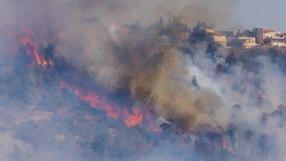
“We’ve taken such serious steps because honestly, I was anticipating something like the delta variant, where it would bypass our assumptions,” Aberson said. “And if we assumed a greater potential danger than actually existed at the time, we would be ready if something came up.”
Now that COVID-19 cases are on the rise, the synagogue — like many across Greater Phoenix — is reevaluating its High Holiday plans, trying to balance the high rate of vaccination within the community with the threat from the delta variant.
“I think anyone who’s being rational is looking at the trend in our numbers in Arizona and going, ‘This is bad,’” Aberson said.
Arizona reported 7,485 new daily COVID cases in the past week, and Centers for Disease Control and Prevention ranked Arizona the eighth highest case rate per 100,000 people among states and territories as of Friday, Aug. 13.
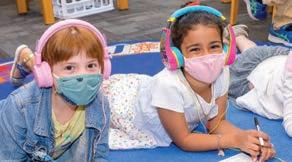
Decisions about how to plan for yet another holiday season in COVID’s shadow are keeping synagogue leaders up at night. Those decisions range from whether to hold services indoors or outdoors, on Zoom or in-person or both, with masks or without, with social distancing or without, and with options available only to the vaccinated or
SEE PLANS, PAGE 2
Plans for $15M Phoenix Holocaust museum include hologram-like exhibit
NICOLE RAZ | STAFF WRITER
Holocaust survivor Oskar Knoblauch has touched thousands of lives, sharing his survival story and its lessons. And despite being 95, he will continue his work for decades to come with the high-tech help of Phoenix’s future Holocaust education center.
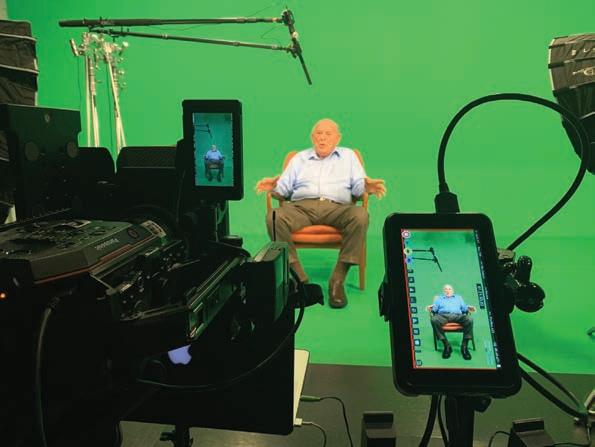
Knoblauch will become a hologram-like exhibit that is planned for Arizona Jewish Historical Society’s $15 million, 4,000-square-foot facility. AZJHS’s goal is to open the center in 2024, contingent on fundraising. It will be only one of seven locations in the world where this hologram-like technology is available.
“I will be done and finished — ready to go — to be presented to the public by mid-2023,” he said. “All I need is this one room in that museum where I can be seen by hundreds of thousands of people around the clock.”
Lawrence Bell, AZJHS’ executive director, said the not-for-profit has had a vision for a Holocaust education and heritage center for about five years. With recent funding for the project, plans are finally coming together.
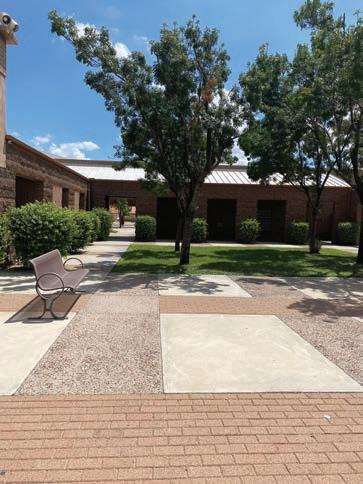
Now more than ever, the general public needs to know about what happened during the Holocaust and why the Holocaust took place, he said.
“We want to show people the destructiveness of intolerance, hatred and racism, and how it consumes the societies that fall for it,” Bell said. “It leads to political division; it leads to situations akin to civil war at times; it can lead to totalitarian states. It leads to genocide, to war and, eventually, it leads to your own self-destruction.”
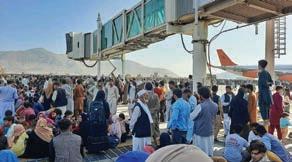
AZJHS hired Gallagher & Associates last year to design a preliminary plan for the center, which includes four spaces. Plans call for the center to begin with an entry that project manager Jeffrey Schesnol described as focusing on the “frighteningly similar” fertile ground for discrimination and prejudice nurtured by radical groups today. The center will also feature artwork by Scottsdale artist Robert Sutz, who has chronicled local Holocaust sur-
SEE HOLOGRAM, PAGE 3
Heat hacks
Jewish Arizonans share summer hacks to beat the heat. To read more, go to p. 19.

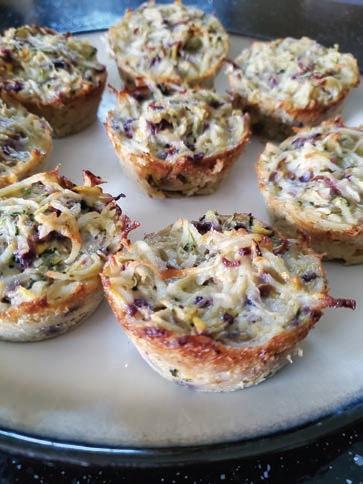
ROSH HASHANAH | 14 NOT YOUR AVERAGE KUGEL Creative twists to old favorite AUGUST 20, 2021 | ELUL 12, 5781 | VOLUME 73, NUMBER 23 $1.50 HEADLINES | 4 TEMPLE CHAI VOTES TO SELL PROPERTY Synagogue set to find new home Jewish humanitarian groups step in, or try to, as crises unfold in Haiti and Afghanistan Spreading Jerusalem blaze leads to emergency mobilization, thousands evacuated Amid debates over vaccines and masks, Jewish day schools buckle down for a third year of COVID NATIONAL INTERNATIONAL KEEP YOUR EYE ON jewishaz.com
PHOTO COURTESY OF FARAH BESHARAT
ISRAEL
Oskar Knoblauch is filmed as part of a USC Shoah Foundation’s Dimensions in Testimony hologram-like exhibit for the Arizona Jewish Historical Society.
PHOTO COURTESY OF ARIZONA JEWISH HISTORICAL SOCIETY
without regard for vaccination status.
Temple Beth Emeth of Scottsdale Rabbi Zari Sussman said her congregation plans to have in-person services with masking and social distancing, and all attendees are required to be fully vaccinated.
“We were very strict before the delta variant became widespread, so we don’t need to change much,” she said. “We have had discussions about the variants and are keeping communication open.”
Chabad of Mesa Rabbi Laibel Blotner originally planned to have in-person services at the Chabad Center. “It can fit 100 people cramped and 75 comfortably, and it is easier to do it in our own facility,” he said. But because of the delta variant, he decided to rent a 4,000-square-foot building, which provides “plenty of room for social distancing,” near Dana Ranch.
Masks will be recommended, but he isn’t sure yet whether they will be required.
Temple Solel Associate Rabbi Debbie Stiel said in some ways this upcoming High Holiday season is even more challenging than last year.
“Then most of us knew we would be offering services virtually,” she said. “This year there are more unknowns such as how many people want to come into the synagogue for services, and how to create an experience that is as meaningful as possible for those watching from home and those in the building.”
Congregation Kehillah Rabbi Bonnie Sharfman said the synagogue’s High Holiday plan is being evaluated regularly.
“It will be reviewed again about a week from now and we’ll see where things stand,” she said.
Kehillah is planning to offer in-person services only to members, “and in person means masked, vaccinated and distanced,” as well as virtually.
“Many more of us are vaccinated now, but it doesn’t make you not susceptible to illness,
it just means that the illness is likely to be less intense,” she said.
The risks delta poses to vaccinated people appear to be low — most of the coronavirus vaccines have remained effective at preventing serious illness and death from the delta variant, and the vast majority of hospitalizations and deaths from delta have been among the unvaccinated.
Still, even vaccinated people who have been comfortable socializing with other vaccinated people in small groups may not be comfortable attending Rosh Hashanah services with hundreds of people. And for vaccinated parents of children who are not eligible for the vaccine, the calculations may be different.
For those attending services on the High Holidays, traditionally the most well-attended synagogue services of the year, that means yet another year of not quite “back to normal.”
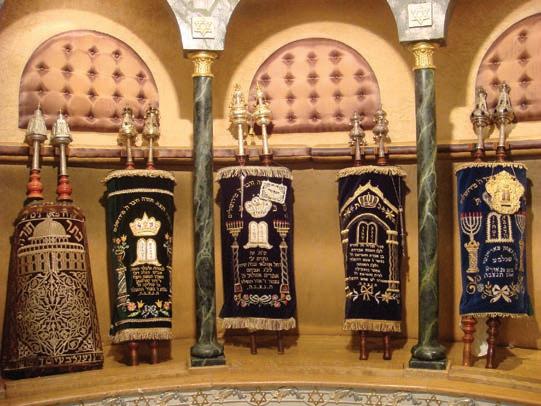
“There’s been a lot of understandable agitation about the precautions we’ve been taking. And just the general frustration of still being in this when we were hoping to be out,” Aberson said.
Sharfman feels people are even more concerned this year than they were a year ago.
Sussman said many of Beth Emeth’s members became isolated during the height of the pandemic. “We want to bring those members back to a supportive community in a healthy way,” she said.
Deciding what to offer and how is weighing on Jewish community leaders.
“I realized early on that I did not want to be responsible, directly or indirectly, for people getting sick and/or being put at risk of permanent harm or death, just for a ritualistic activity,” Aberson said. “Our tradition makes it perfectly possible to pray
independently and fulfill one’s obligations, and overriding concerns come into play with things like a pandemic.”
Sharfman said the highest Jewish value is pikuach nefesh: The preservation of human life overrides virtually any other religious rule.
“While our goal is to open as fully and as quickly as we can safely do, we do not want to cause harm in the process,” she said.
Blotner said he is managing people who are just as reluctant to put a mask on as they are taking them off.
He said it is worth being inconvenienced to protect your own health and the health of others around you.
“I pray every day that every person who comes to our synagogue, God forbid, does not get sick,” he said, noting he wants everybody to do only what they are most comfortable doing for themselves.
Stiel feels everybody is “suffering from COVID fatigue.” The pandemic has been going on for 18 months, people are mourning the loss of loved ones and fearing for their own safety.
“I hope the High Holidays will provide all of us with some uplift in these challenging times. The music, the liturgy and the holiness of the season are so awe-inspiring, and I think we need a good dose of that now for our mental well-being.” JN
JTA contributed to this report.
January 8
January 22
February 5
February 19
March 5
March 12
March 19
March 26
April 2
April 16
May 7
May 21
June 4
July 9
August 6*
August 20
August 27
September 3
September 10
September 24
October 1
October 15**
November 5
November 19
December 3
December 17
PUBLISHER Jewish Community Foundation of Greater Phoenix


GENERAL MANAGER Rich Solomon | 602.639.5861 rsolomon@jewishaz.com


MANAGING EDITOR Shannon Levitt | 602.639.5855 slevitt@jewishaz.com
STAFF WRITER Nicole Raz | 602.872.9470 nraz@jewishaz.com
ADVERTISING SALES CONSULTANT

Jodi Lipson | 602.639.5866 jlipson@jewishaz.com
SUBSCRIPTIONS
602.870.9470 x 1 subscriptions@jewishaz.com
GRAPHIC DESIGNER Frank Wagner | 410.902.2300 ads_phoenixjn@midatlanticmedia.com
Jaime Roberts, Publisher | 2013-2016 Florence Newmark Eckstein, Publisher | 1981-2013
Cecil Newmark, Publisher | 1961-1981 Pearl Newmark, Editor | 1961-1981
M.B. Goldman, Jr., Founder | 1948-1961
PROUD MEMBER OF
2 AUGUST 20, 2021 JEWISH NEWS JEWISHAZ.COM WWW.JEWISHAZ.COM
*Best of Magazine **Annual Directory
2021 Phoenix Jewish News Print Dates
HEADLINES PLANS CONTINUED FROM PAGE 1 ©2021 Phoenix Jewish News, LLC, an asset of the Jewish Community Foundation of Greater Phoenix. Awards: Arizona Newspaper Association, Arizona Press Club, National Federation of Press Women, Arizona Press Women, American Jewish Press Association. Member: American Jewish Press Association, Jewish Telegraphic Agency, National Newspapers Association. Jewish News (ISSN 1070-5848) is published less than weekly, by Phoenix Jewish News, LLC, dba Jewish News. A subscription is $48 per year, payable in advance to Jewish News, 12701 N. Scottsdale Road., Suite 206, Scottsdale, AZ 85254, telephone 602-870-9470. Periodicals postage paid at Phoenix, Arizona. POSTMASTER: Send address changes to Jewish News, 12701 N. Scottsdale Road., Suite 206, Scottsdale, AZ 85254. VOL.73, NO. 23 | AUGUST 20, 2021 12701 N. Scottsdale Road, Suite 206, Scottsdale, AZ 85254 Phone: 602.870.9470 | Fax: 602.870.0426 | editor@jewishaz.com | advertising@jewishaz.com subscriptions@jewishaz.com | www.jewishaz.com HEADLINES 2 Local OPINION 10 Editorials Commentary TORAH COMMENTARY 12 SPECIAL SECTION: ROSH HASHANAH 13 SPECIAL SECTION: HOME DESIGN & REAL ESTATE 16 LIFESTYLE & CULTURE 18 COMMUNITY 20 Calendar Community Milestones OFFICE HOURS 8 a.m.-5 p.m. Monday-Thursday 8 a.m.-12:30 p.m. Friday DEADLINES EDITORIAL: Noon, Tuesday 9 days prior to publication
a.m.,
ADVERTISING: 11
Friday 3 days prior to publication
Top Left: Photo courtesy of Shannon Levitt | Top Right: Photo courtesy of Jennifer Starrett | Bottom Left: Photo courtesy of SAR via JTA.org Bottom Middle: Photo by AFP via Getty Images via JTA..org | Bottom Right: Photo by Yonatan Sindel/Flash90 via JNS.org
“Bet El synagogue Casablanca -torah scrolls” by dlisbona is licensed under CC BY 2.0
Bell said WWII is fading from popular consciousness and the entry point will help today’s young people see the relevance of the Holocaust in today’s world.
Visitors will then enter the largest part of the center, focusing on the “nuts and bolts of what happened” and the experience of Jews leading up to the war. Then, they will have an opportunity to learn from local Holocaust survivors through recorded testimonies.
“We want to focus locally, because we’re not building the U.S. Holocaust Museum; we’re building a place for local people to be
and father were assigned to work at the headquarters for the Gestapo.
His father, who had secured some measure of safety for himself and his family through his rare skill in refurbishing coats and fur, was murdered in 1944 — eight months before Knoblauch and his siblings escaped on Jan. 17, 1945. It was the same day their fellow workers were deported to a concentration camp in Germany that few survived. He and his siblings were liberated the following day by Soviet soldiers and were fortunate to reunite with their mother and cousin.
“There were so many close calls, even at the last minute,” he said. “I cannot figure out the riddle.”
Before being liberated they were accused of
“It was like a never-ending story. What else
“You cannot answer everything the way you really want to,” Knoblauch said. “This subject Schesnol said the goal is to raise $15 million over three years from donors, corporations and the general public. So far, AZJHS has raised
Tim and Susie Ernst are among the funders for the project, and fully funded the hologramlike exhibit. Susie is the daughter of Holocaust survivors. Creating a Holocaust education center will honor her parents’ memories, and she hopes to prevent such atrocities happening to anyone — Jewish or not — again.
able to come and visit and learn about the Holocaust,” Bell said. A new Arizona law mandating Holocaust education means plenty of potential for student visits.
In this area, Knoblauch will appear as a lifesize, 3D image on a screen and visitors will be able to ask him questions that prompt real-time answers. AZJHS partnered with the USC Shoah Foundation’s Dimensions in Testimony to create the exhibit.
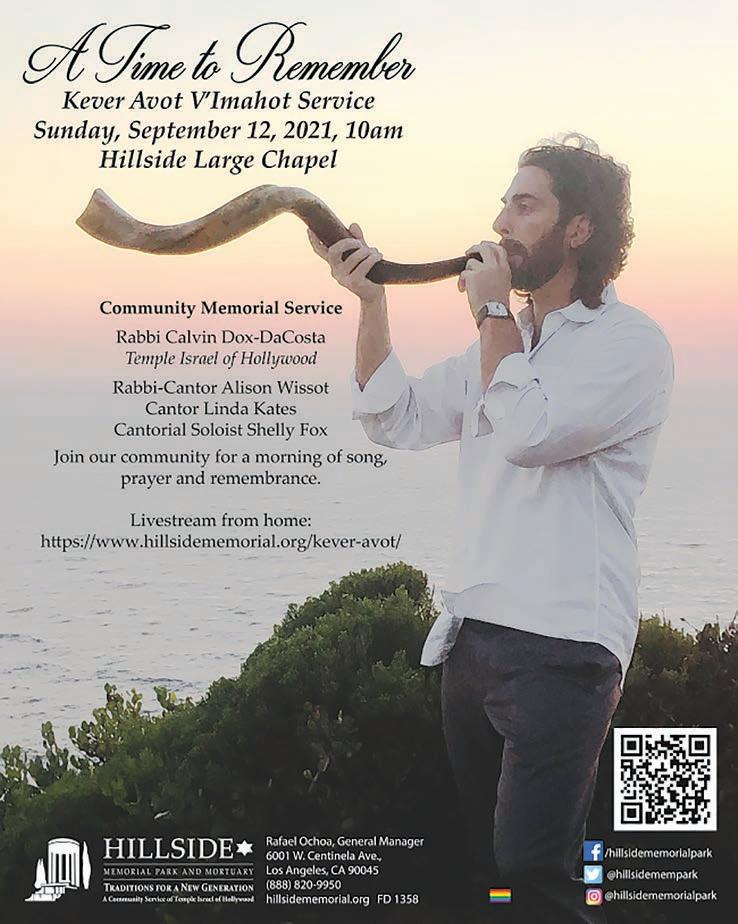
“We understand very well the power of conversation between Holocaust survivors and the younger generation,” Stephen Smith, executive director of the USC Shoah Foundation, said in a video about the technology. “That conversation, that moment of dialogue where I ask my question and I get it answered — it’s just magic in the room when that happens and we wanted to try and find a way and preserve that as best as possible.”
Knoblauch did the filming for the project during the last week of June.
He was born in November 1925, in Leipzig, Germany. In 1936, he and his family were forced to leave because his parents were Polish citizens.
“I had to fight to be accepted by my peers. Nobody wanted me. They called me a foreigner, a German, a Jew. They hated Germans; they hated Jews,” he said.
He continued his education until the outbreak of WWII in September 1939. Soon after the German occupation of Poland, he and his family were again faced with restrictions imposed on the Jewish population.
In March 1941, his family was separated from his mother, who was sent to a slave labor camp, Plaszow. Knoblauch, his brother, sister
As a child, she only vaguely knew about the pain and loss her parents had endured. But it wasn’t until her 20s, when she went with her parents to Detroit’s Holocaust museum, that she got a clear picture.
“Right afterward, my dad began sharing his story in exquisite detail. Things even my mom had never heard. It became important to me at the time to share his story and the stories of others,” she said. When the opportunity arose to help create a Holocaust education center in Phoenix, she and her husband agreed to do “whatever we can personally and financially do to help make it happen.”
Tim said there is no time to waste in seeing plans for the center through.
“Hate crimes, including antisemitic, antiAsian and anti-Muslim acts of violence, are on the rise in our community and the nation,” Tim said. “We need to celebrate the value of diversity and stand up against marginalizing people of different skin color, different traditions and cultures, or different belief systems.”
He noted Phoenix is the largest city in the nation without a Holocaust museum.
Knoblauch said the plans for a Holocaust education center in Phoenix concern every Jewish person.
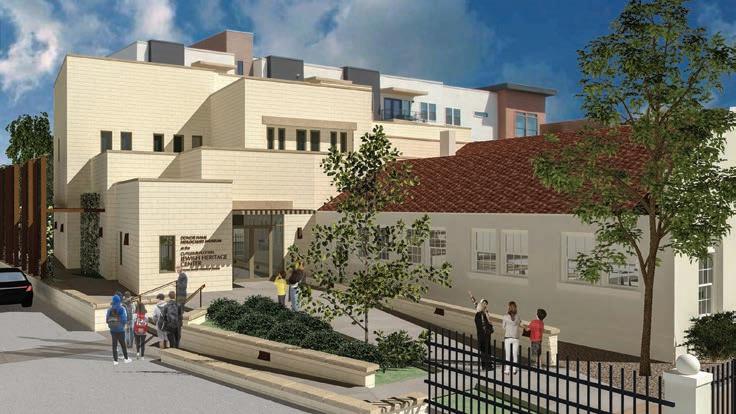
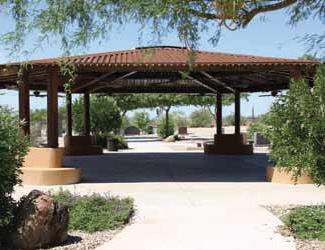
“It’s going to be one of the best little museums in the Southwest,” he said. “Change in the world can come only with good education.”
But, he said, plans are only as good as their financial backing.
“Build me that home in downtown Phoenix,” he said. “Maybe people should look into donating. Not their time, but a little bit of their money. You know, you cannot take it with you.” JN
Lead Engineer, CAE:
Use CAE tools for safety & durability, build CAE crash/structural models. Req’s Masters degree in Mech. Eng., or related w/2 yrs exp meshing tools for FE model dev & FEA. Travel req’d.
Lead Engineer, Interiors:
Responsible for design & specification for interior design projects; outlining deliverables, design concepts, space planning. Req’s Bachelors degree in Indust., Manufact., or Mech. Eng., or related w/5
JEWISHAZ.COM JEWISH NEWS AUGUST 20, 2021 3
HEADLINES HOLOGRAM CONTINUED FROM PAGE 1 Mt.
Please
A Jewish Cemetery that cares about the Jewish Community • Jewish Owned and Operated • Sidewalks at Every Grave • Caring Professional Sta • Intermarried Families Welcome (480) 585-6060 24210 N. 68th Street, Phoenix (o Pinnacle Peak Rd) mtsinaicemetery.com IS SEEKING THE FOLLOWING TALENT IN PHOENIX, AZ: SEND TECHNICAL RESUME TO ATTN: HR, NIKOLA MOTOR CO., 4141 E BROADWAY ROAD, PHOENIX, AZ 85040
Sinai Cemetery is pleased to partner with Hillside Memorial Park again for this year’s annual Kever Avot Memorial Service.
join the virtual service by following the link provided below or by scanning the QR
code in the lower right corner.
yrs
interiors. Travel req’d.
exp auto industry focus on
A rendering of the main entrance of the Arizona Jewish Historical Society Holocaust education center.
PHOTO COURTESY OF ARIZONA JEWISH HISTORICAL SOCIETY
Temple Chai votes to sell property
SHANNON LEVITT | MANAGING EDITOR
Members of Temple Chai have three years to find a new home.
After six days of online voting last month, 61% of the synagogue’s members said yes to the sale of Temple Chai’s property at 4645 E Marilyn Rd. in Phoenix to its longtime neighbor, Scottsdale Christian Academy.
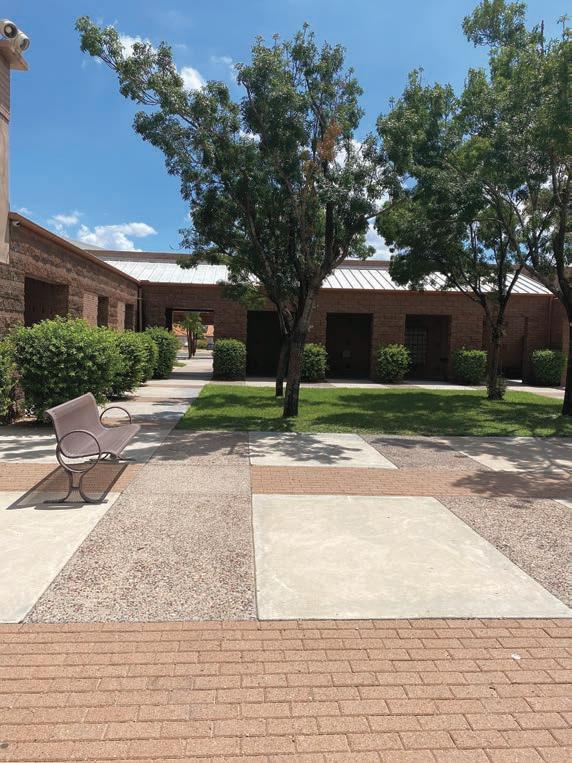
In the months leading up to the vote, the idea of selling the synagogue’s property was difficult for some congregants to accept and led to discord. But now with the vote over and a majority of the membership signaling a readiness for change, clergy, staff and congregants are working to heal the divisions and move forward together.
Robbie Gross, a synagogue member since 2017, said he’s just waiting to see what happens.
Sharon Lewis, a member of 25 years, said, “I’m not very attached to bricks and mortar, but some people are.”
Rabbi Bonnie Koppell, who described the Temple Chai community as “the most loving place on earth,” is certain that “the congregation that designed this beautiful place is capable of designing another one.” And anywhere they end up, “the ritual objects most meaningful will come with us,” she said.
Debbie Blyn, Temple Chai’s former executive director, said that for a long time, there were no plans to sell its property. But there were offers. And when one from SCA came, the board investigated.
The synagogue and church have had a longstanding relationship, Blyn said. Temple Chai has used SCA’s property and the church has used the synagogue’s parking lot for overflow events of its own.
Despite the congregation’s emotional attachment to the property, Blyn said, there were many considerations in favor of selling: The building is old, and the administrative buildings need updating with all the associated costs of repair or replacement. And there are security issues, because the campus is very open.
“It’s, quite honestly, not the way a Jewish campus would be built today,” she said.
Temple Chai Cantor Ross Wolman agreed. “We’re at a crossroads, and the trend in synagogues is that people are moving and synagogues are changing — buildings are a liability,” he said, explaining that a majority of the space goes unused most of the week and keeping it all cool in the summer is expensive.
The structure is full of great stories and memories, he said, but he’s focused on the opportunity to create a new worship space and early childhood center. “There will be places for children to learn, places for people to celebrate and there will be new memories.”
One board priority is ensuring any transition for its early childhood center “will be as seamless as possible,” said Lea Plosker, vice president of education at Temple Chai. She was also clear
that families of b’nai mitzvah children will have a bimah and Torah for their child.
Once the board signed on to the deal in May, membership had until Aug. 2 to agree. But not everybody was ready to.
Some congregants were happy with the news, viewing the sale as an opportunity to start fresh.
Lewis, who assisted in setting up the eventual vote, felt it was an opportunity for the synagogue to get its finances in order so that it can “thrive and grow,” she said.
Some members who supported the move had a few doubts.
Gross voted yes, in part, to ensure financial stability. But he worries that there’s no certainty about the next location. And having grown up in a “traditional-looking” Pittsburgh synagogue, he likes the look of Temple Chai. “It has a very synagogue vibe to it,” he said.
The real problem, he said, is the “bitterness” of some members opposed to the sale.
A group of them formed the Temple Chai Vote “No” Committee and sent an email July 14, ahead of the voting, to the entire congregation outlining their concerns.
They argued the board should take a more “prudent” approach, and questioned whether selling the building was the best course of action, especially in such a short time frame. They also outlined other options like repairing certain parts of the facilities or selling only parts of the campus.
And those opposed to the sale had emotional considerations, such as a personal attachment to the existing sanctuary. “Our sanctuary has been a site of numerous important events for many of us, and this creates great value for our congregation,” they wrote in the email.
In June, Temple Chai surveyed the congregation regarding the sale and 350 people participated. The numbers showed that before the vote at least half of the congregation was at least “likely” to vote for the sale. Twenty-one percent were undecided and the rest were at least “likely” to vote against.
Janice Dinner, president of the synagogue, wrote in a long email to congregants July 2, that the survey found members were clearly concerned about the physical location of a new synagogue, its aesthetics and the emotional toll of leaving the current sanctuary.
“I too love our sanctuary, and I too contributed to its creation,” Dinner wrote. “Knowing we must leave is painful to me.”
She responded to many of the concerns raised in the survey, which would later be reiterated by the Vote “No” Committee: A partial sale does not seem realistic; the search for a new rabbi following Rabbi Mari Chernow’s departure in June after 18 years won’t be negatively affected; the synagogue’s financial situation is reviewed at the annual meeting; and capital campaigns have fallen short when less money was needed in the past.
Dinner acknowledged her discomfort with “the tenor of the conversa tion” about the sale. She encouraged the congre gation to “go forward together” and “keep our focus on the common goal we all share ensur ing that Temple Chai is vibrant, lively, healthy (financially and other wise) for generations to come.”
Given that the vote was not close, Dinner hopes the results will help the congregation move past this tumultu ous season.
“We can now envi sion our future and who we want to be,” Dinner said. “We don’t have to be everything to every body — there are infinite possibilities.”
SCA is in the 60-day period to complete its due diligence of the contract, which will be followed by an additional 30 days before the deal closes, although SCA could decide to move faster. Under the arrangement, Temple Chai will lease the current building for two years while a new location is found and voted on. A third year of leasing is available if the congregation does not make a decision by that time.
Brent Hodges, SCA’s superintendent, declined to comment until the sale is final.
The purchase price is $5.1 million and includes a credit of $300,000 for two years of prepaid rent. Blyn said Temple Chai should net approximately $3 million after paying off the balance of the mortgage.
Lewis was relieved by the vote’s margin. The vote to sell represents an opportunity to determine “what will work best for the next 20 years in the Phoenix Jewish community and how we fit into this larger picture — to me, it’s a huge gift.”
Gross theorized part of the bad feelings surrounding the sale could have been due to COVID. “Face-to-face communication keeps congregations together,” he said.
On Aug. 6, the synagogue held “a service for healing and peace.” Congregants from both sides of the issue attended, and Wolman said progress was made towards reconciliation. Clergy, staff and congregants are now conversing regularly about what they want and need in a new structure.
“While it was difficult,” Wolman said, “we’re moving on together and people are telling me they’re ready to back the board so we can have a future.”
30 years who opposed the sale, said he believes everyone on both sides of the question wanted what was best for the congregation. He further explained, “We all accept the congregation’s decision and we’re united in our desire for a strong ongoing Temple Chai community, whether the buyer elects to go through with the sale or not.”
Koppell wasn’t overly disquieted by the difference in opinion. “That’s the Jewish way,” she said.
Having gone through a similar situation when she was the rabbi of Temple Beth Shalom of the East Valley, she understands and empathizes with the heartache of some members.
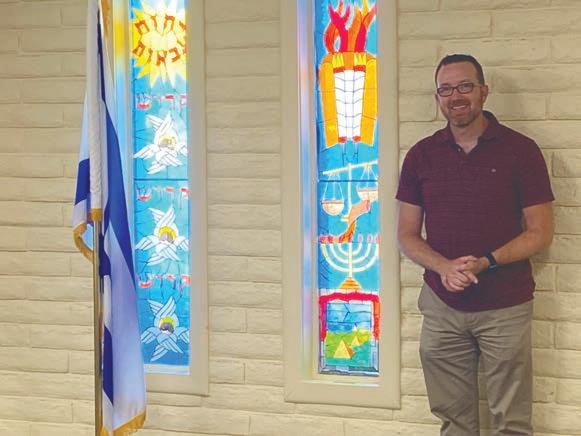
“This change is just a lot for people to absorb right now,” she said. In addition to the sale, and Chernow’s departure, Blyn stepped down in June as executive director.
But Koppell also knows how exhilarating change can be. “I remember how exciting it was when we physically walked the Torah scrolls from the old sanctuary to the new one in the East Valley.”
Plosker said, “Our community is about the people. No matter where we go, this will always be the case.”
Lewis, too, is preparing for the next phase. She recounted that Temple Chai started in someone’s backyard, moved to a strip mall and the current structure originated from a horse barn and grew “hodge-podge from there. Now there’s an opportunity to get it right — plan for growth and do it in a thoughtful way.” JN
HEADLINES LOCAL 4 AUGUST 20, 2021 JEWISH NEWS JEWISHAZ.COM
Temple Chai’s courtyard PHOTO BY SHANNON LEVITT
Cantor Ross Wolman in Temple Chai’s small sanctuary, which started out as a horse barn.
PHOTO BY SHANNON LEVITT
Young rabbis rove through rural Arizona looking for Jews
NICOLE RAZ | STAFF WRITER

Rabbis Mendel Slonim and Berel Marozov spent two weeks in rural Arizona this summer finding and connecting with rural Jews.
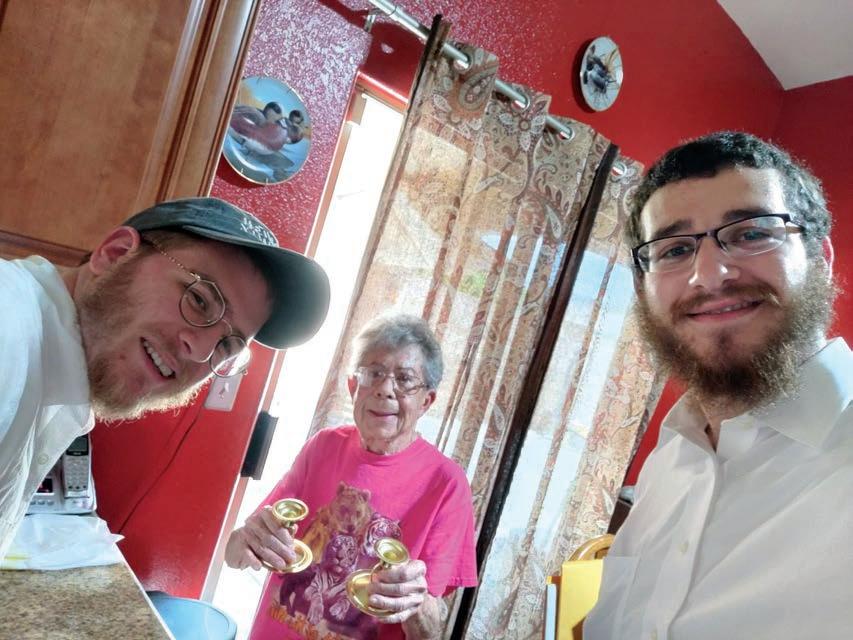
“There are many connections to be made, and many Jewish people to reach,” said Marozov, 21.
Slonim, 21, agreed. “Who knows the last time they saw a Jewish person, or the last time they conversed with a Jewish person? It’s like visiting a real far-off brother and sister.”

Slonim and Marozov are among 250 young rabbis participating nationally in Chabad’s 78-year-old Roving Rabbis program. Their mission is to connect with as many isolated Jews as possible and give them access to Judaism — something not readily available — throughout the year, they said.
Slonim, from Binghamton, New York, and Marozov, from Cleveland, Ohio, began their work in the Kingman area Aug. 1, and visited more than 40 cities over the next two weeks.

Finding Jews in rural areas takes some dedication and creativity.
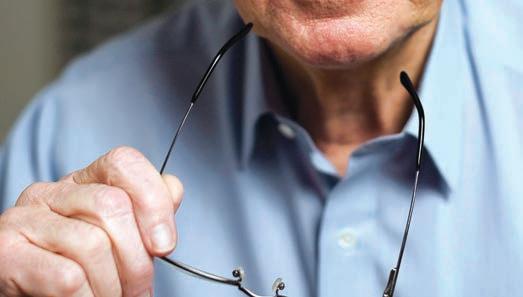
The two rabbis had a list of people from previous years, and knocked on doors. They
also planned to find Jews using word of mouth, and went through the phone book looking for Jewishsounding names.
Chabad of Paradise Valley Rabbi Shlomy Levertov, who was a roving rabbi himself in 2008, has been helping participants assigned to Arizona with their trip logistics for over a decade.
He recalled one episode in which a roving rabbi saw a Jewishsounding name on the back of a car driving by, which seemed associated with a law firm. “So they called it, and the guy was so excited he literally pulled over on the side of the highway and they started chatting,” he said. “There’s always many different opportunities.”
Reaching out and connecting with Jews who live in rural places is important for the individual as well as the Jewish community as a whole, he said.
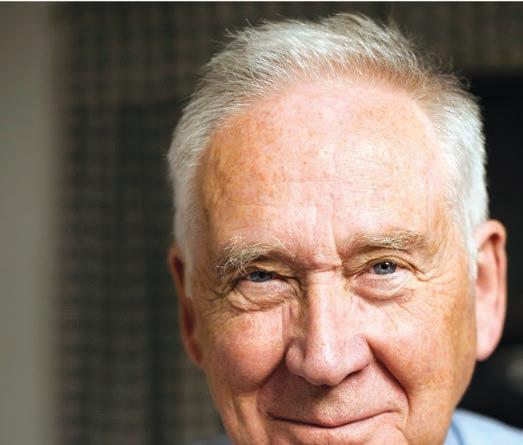
Levertov said one woman in Dolan Springs sends a letter every year after her visit with the roving rabbis to express her delight and desire to have more visits from
rabbis throughout the year.
“A lot of people are Jewish in these towns and they’re alone — there’s nothing catering to their needs as a Jew,” he said.

The Roving Rabbis’ program is important to the Jewish community because “we’re all one family,” Levertov said, and everybody needs to be catered to.
Slonim has been to Arizona several times
before to visit family, but the heat still takes some getting used to. “We’re coping,” he said, noting there have been times he wished for a dry heat during humid New York summers.
It’s Marozov’s first time in the Grand Canyon state, and he is enjoying the hills and mountains compared to Cleveland’s flat landscape. JN
JEWISHAZ.COM JEWISH NEWS AUGUST 20, 2021 5 HEADLINES LOCAL
What can you learn about senior living at our upcoming event? 7325 E. Princess Boulevard, Scottsdale, AZ • MaravillaScottsdale.com • 480.269.1952 CARF ACCREDITED | CASITAS | COURTYARD RESIDENCES | INDEPENDENT & ASSISTED LIVING | MEMORY CARE EQUAL HOUSING OPPORTUNITY A whole bunch. It’s casual, easy and you’re invited. Brunch & Learn Wednesday, September 1st • 10:30am Join us for an informative presentation on senior living and the exceptional services & safeguards offered. Afterwards, take a tour of our beautiful community followed by a lovely brunch prepared by our culinary team. Seating is limited. To make a reservation, please call 480.269.1952
Rabbi explains why fat activism is necessary in Jewish spaces
SHANNON LEVITT | MANAGING EDITOR
Shmuly Yanklowitz, VBM’s president and dean, was open to the idea. “I thought I might have to do some convincing but he was on board right away,” Cox said.
“All bodies are good bodies but another way to say that is we’re all images of God,” she said, reiterating Bromberg’s work. “The body is sacred in Judaism so it’s not appropriate to hate your body or denigrate your body. We should all be OK in our skin.”
Yanklowitz, too, said Bromberg’s work “aligned very deeply with our vision and mission to expand the Torah’s reach to new pressing moral issues and in engaging new, diverse, often marginalized Jewish populations.” He’s eager to see what type of conversations and learning possibilities evolve from this event, which was recorded and shared widely.
Bromberg admires VBM’s work on inclusion and said that part of her organization’s goal is to ensure that weight stigma belongs on the agenda.
“It impacts people, especially women, of all sizes, who spend so much time and money trying to police their bodies to be a shape they were never meant to be,” she said.
During the presentation, she asked participants to form breakout groups where they could talk about their personal experiences and ideas. Ultimately, she said, these issues have to be addressed communally.
Before the COVID-19 pandemic, Rabbi Minna Bromberg’s work addressing weight stigma in Jewish communal spaces took her to a lot of synagogues. She was often bewildered when organizers provided her a chair that was too small. Getting people just to acknowledge her body and their discomfort with it is one reason she founded Fat Torah a year ago.
“Because people are so uncomfortable with fat bodies, they don’t see my needs — but I feel it should be obvious,” she said. “They can see my body but don’t give me the right chair. It’s literally a consciousness-raising need. People don’t think about fat people’s needs.”
In her “What’s Jewish about Fat Activism?” webinar sponsored by Valley Beit Midrash on Aug. 5, Bromberg talked about how Jewish professionals can start to confront and diminish weight stigma using Jewish sacred texts and tradition. Fat Torah’s mission is to educate people that regardless of body size, everyone deserves equal treatment, health care and employment. And everyone deserves to be treated with dignity.
Bromberg explained that the most basic
text that speaks to this issue is that all humans are created in the divine image — that includes our bodies. This concept is elaborated in Talmud and Sanhedrin with conversation about every human having value and the importance of uniqueness.
While these texts don’t specify body size, she said, they do speak about human worth.
She told participants she started dieting as a 7-year-old and adults were supportive of that destructive decision. By the time she was 16, she had been on many diets and thoroughly hated her body. It was time to try something different.
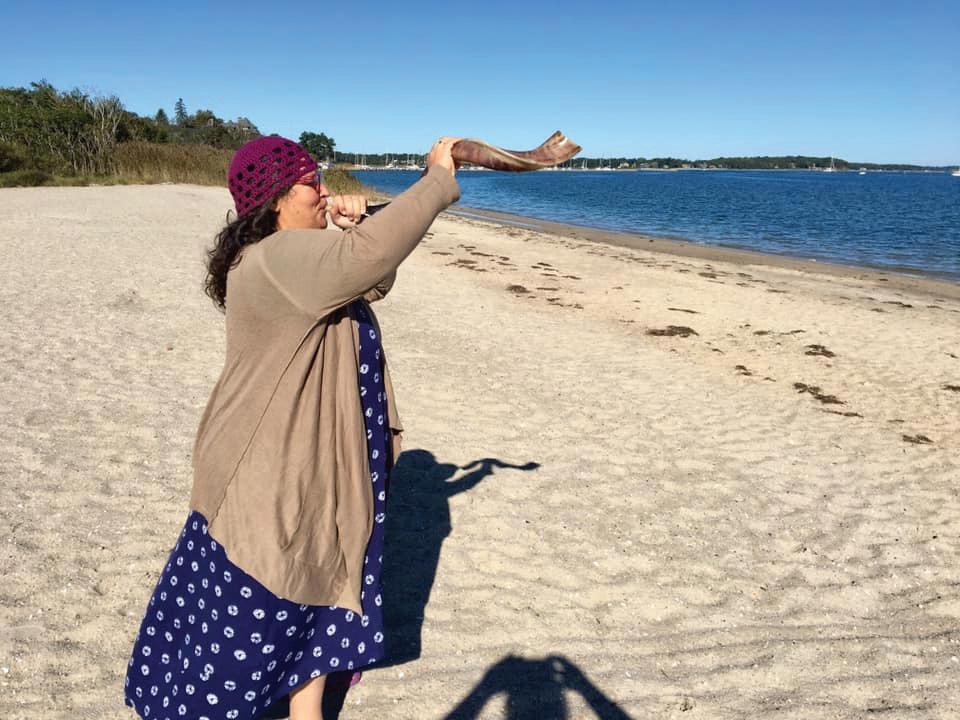
Bromberg has been involved in fat activism since she was a teenager in the 1990s and said people still don’t react rationally to her body. And she knows she’s not alone.
“My own activism for most of the last 20 years or so has been showing up in my own body in public and not being afraid or ashamed to do that,” she said.
And that includes in Jewish spaces.
Physical accessibility in synagogues is a longstanding problem, especially for the largest people, she said.
She’s happy to point out synagogues
that make an effort to accommodate larger people by providing chairs without confining arms. And if chairs like this are claimed by people who don’t need them, that’s a problem, and that’s a place where communal education is necessary, she said.
These are the types of issues that caught Edith Cox’s eye when she first read Bromberg’s blog sent to her by a friend.
“I was really excited because I had been thinking for a long time that fat activism is a social justice issue, but I never made the Jewish connection,” she said.
Cox is a longtime supporter of VBM and appreciates its focus on social justice, but she didn’t think fat activism was on their radar. Cox said food is a big part of Jewish identity, and as Jews, “we get a lot of mixed messages.”
Bromberg agrees that there’s some “weirdness around food and bodies,” including a lot of concern about scarcity and if someone is getting enough food.
Cox is excited about the possibility of expanding minds when it comes to how people perceive bodies, including their own, and getting them to see things from a new -— and Torah — perspective.
She was a bit surprised that Rabbi Dr.
Jesse Rubenstein, Temple Emanuel of Tempe’s religious school director, gave the presentation rave reviews. “So rarely do we talk about the issue of bodies in our physical spaces — giving a nudge in that direction was really refreshing and something I never thought could happen,” she said.
Jewish texts remind us, Bromberg said, that while we don’t have control over our thoughts, we can control our words and “what we loose into the world and whether it’s liberatory or destructive.” She also left people with one piece of advice: Stop complimenting weight loss. Not only does it send negative signals about a person’s preexisting body, but the change could be due to something like illness.
In order to educate people about weight stigma, she said it’s important to have a loving relationship with her own body, which is something she can model to others. “In a world that tells me I don’t belong, it’s a radical act to love and accept my body,” she said.
But self-love can’t protect her from discrimination, and that’s one reason this work is important and ongoing, she said. JN
HEADLINES
LOCAL 6 AUGUST 20, 2021 JEWISH NEWS JEWISHAZ.COM
Rabbi Minna Bromberg blowing a shofar on the beach.
PHOTO COURTESY OF RABBI MINNA BROMBERG
Aaron Lieberman wants to be Arizona’s first Jewish governor
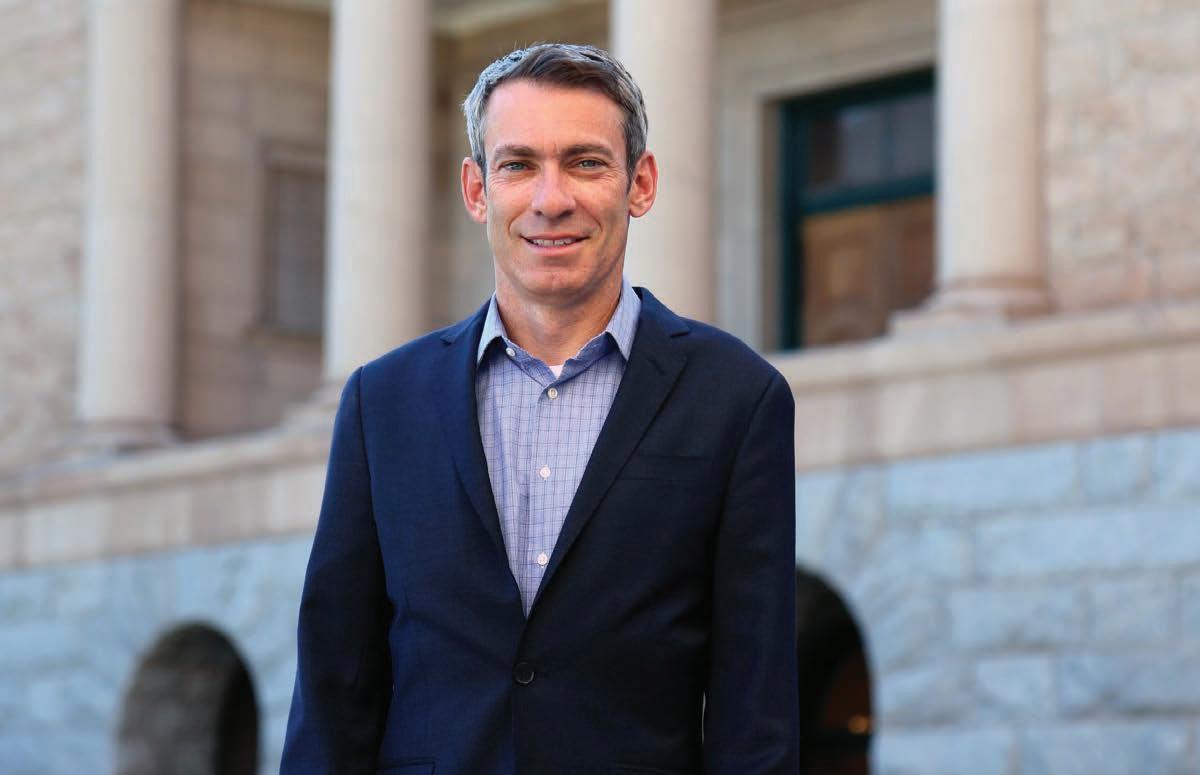 NICOLE RAZ | STAFF WRITER
NICOLE RAZ | STAFF WRITER
Democratic Rep. Aaron Lieberman (LD-28) announced June 29 that he’s running for governor. If elected, Lieberman would be the first Jew to hold the office in Arizona history.
“That would be wonderful,” he told Jewish News. While he would take pride in that accomplishment, “the job is about represent ing all Arizonans,” he said, no matter their background, political or religious persuasions.

In 2018 Lieberman became the first Democrat to be elected to LD-28’s second seat in the Arizona House of Representatives. The work he did to earn his seat in the con servative district, which includes Paradise Valley, is the same work he’ll have to do to win statewide, he said.
“We still have 135,000 more registered Republicans than Democrats. You have to convince people — lots of our Independents and a slice of our Republicans — that you’re focused on actually moving the state forward with solutions that are broadly supported by voters. And that’s my whole platform.”
He is running on four issues: a full recovery from the COVID-19 pandemic, investing in education, increasing access to affordable, high-quality health care and ensuring clean air and water for future generations.
“There’s a sense that our politics are broken, and when we should have been coming together to deal with COVID, it feels like we’ve been coming apart,” he said. His vision for a recovery from the pandemic addresses its economic toll on small businesses by renewing and expanding a grant program for businesses with fewer than 25 employees.
“The economy has definitely showed some good signs, but for many Arizona businesses, you really make your money in the spring, and you try to get through the long summer, and even into the fall, and missing out on a lot of that winter tourism and that spring boom, we still have some of our true local small businesses that are really struggling,” he said.
He’d also like to address the pandemic’s ramifications on the state’s health care and education systems, while also still monitoring infection rate data and new variants.
He describes education as one of the “animating passions” of his life and as governor would “fix and fund our schools.” He would like to see higher teacher pay, too.
“We need to continue to dramatically increase funding for our schools and specifically funding for our teachers so that we can get more teachers in the classroom. Then you can start to reduce class size and do other things like that,” he said. He also wants to have preschools across the state and reduce the costs of community college.
Lieberman founded two organizations focused on early childhood education before
pany that runs nearly 50 child care centers for low-income families around the country. He was CEO of Acelero for 13 years before transitioning to board chairman.
More recently, Lieberman spent two years as CEO of Phoenix Spine, and in 2017 became a partner with New Profit, a venture philanthropy organization that backs social entrepreneurs advancing equity and opportunity. Lieberman founded and led New Profit’s Early Childhood Support Organization, which provides leader and educator development and curriculum coaching to support better outcomes for low-income children who are enrolled in subsidized child care programs.
On the issue of health care, he wants to expand KidsCare, Arizona’s children’s health insurance program.
“For less than $10 million in additional state investment, we could double the enrollment and eligibility for KidsCare and draw down another $60 million in matching state funds. It makes economic sense and will, most importantly, get more kids covered in Arizona.”
When it comes to clean air and water, he takes aim at the current leadership in the legislature and at Gov. Doug Ducey. They have not been willing to talk about or acknowledge climate change, he said, “and that’s just silly and wrong.”
He plans to put policies in place that will ensure “we’re giving a better state to our kids than the one that we found.”
Lieberman says funding for his vision is already there. In the time he’s been in the leg-
ting and start investing in things that make Arizonans broadly more successful.”
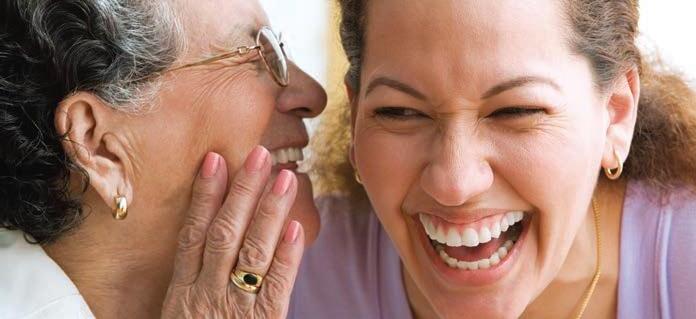
Lieberman is one of three Democrats, so far, who have announced they are running in the Democratic primary for the state’s highest office. He joins Secretary of State Katie Hobbs and business adviser Marco Lopez, who was an aide to former Gov.
He said what sets him apart is his executive experience at a large organization.
Rep. Alma Hernandez (LD-3), who is also Jewish, endorsed Lieberman in
“I know that if he sets his mind to something, he will move heaven and earth to make it happen. That’s the tenacity we need in the Governor’s office, and that’s why I am supporting Aaron for Arizona,” she said in Lieberman said he knows how to work with people from all different backgrounds and parties to get things done.
“I’m 2-0 in kind of uphill, challenging races. I hope to be 3-0 and be our next gov-
HEADLINES
LOCAL JEWISHAZ.COM JEWISH NEWS AUGUST 20, 2021 7 909 East Northern Avenue • Phoenix, AZ LaSienaSeniorLiving.com • 602.635.2602 CARF-ACCREDITED INDEPENDENT & ASSISTED LIVING Imagine life with a complete support system . It’s like an extended family working together and making things easier. Meals, prescriptions, appointments, personalized care, even a hobby or two, all taken care of. Having it all, and an extra hand when you need it. That’s Assisted Living at La Siena. A team. A family. An assist with everything that matters. That’s the Power of WE. Call us today to learn more.
Arizona teens return from Israel
NICOLE RAZ | STAFF WRITER
After more than a year, buses filled with youth tour groups were again zipping around Israel this summer.
“There were a lot of Jewish organizations I never even heard of,” said Colin Morris, who lives in Gilbert.
Morris returned from a three-week tour in Israel on Aug. 1, organized by Cteen, the Chabad teen network. His trip overlapped with that of several other Phoenix-area teens, who were participating in a program run by Jewish National Fund.
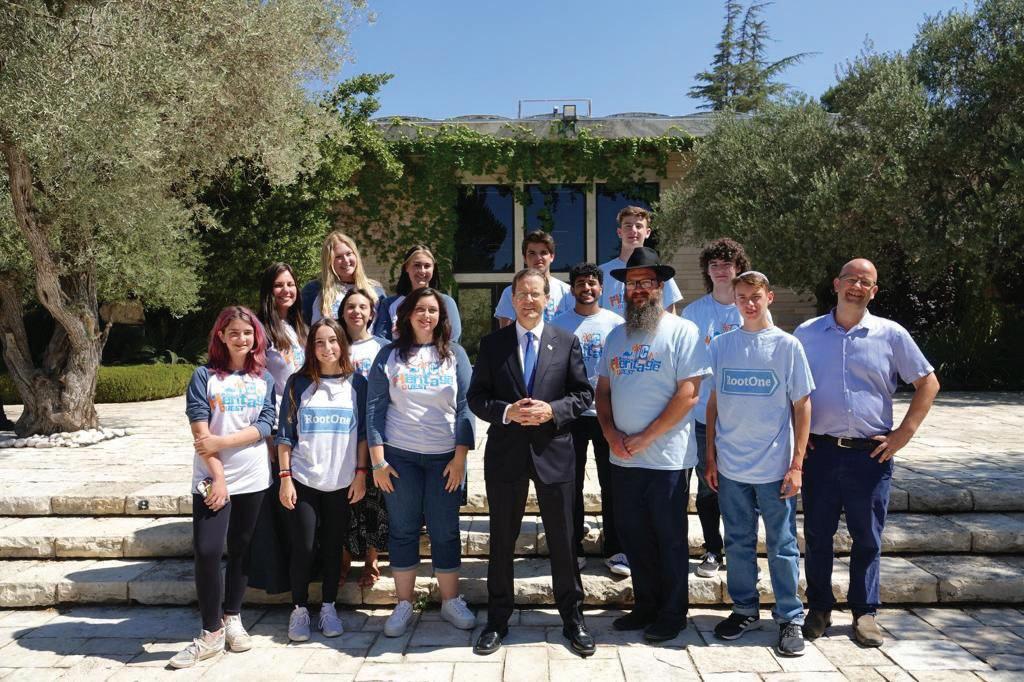
Morris, 18, was grateful he got to go at all considering the uncertainty caused by the spate of violence between Israel and Gaza in May and the ongoing COVID-19 pandemic.
CTeen’s Heritage Quest Israel trip was supposed to include a visit to Poland, but COVID canceled that portion.
It was Morris’ first time in Israel and he said his experience at the Kotel resonated with him the most. “Just being there and seeing everyone and how they pray and seeing all the different types of Jews that show up was pretty cool.”
He joined CTeen about two years ago to be around more Jewish teens. “I was never really around anyone that was Jewish, because the Jewish community isn’t very big. So I just wanted to be a part of that,” he said.
Hannah Gilmartin, 18, also lives in Gilbert and was on the same trip.
“It was an amazing experience just getting in touch with the Jewish side of myself,” she said. Her mom is Jewish but her dad is not. She was most touched by experiencing Shabbat at the Kotel.
“It meant a lot to me. Being there was me being fully Jewish. It was really eye opening,” she said.
Morris and Gilmartin were among a group of 11 who made an official visit to meet with President Isaac Herzog at his residence.
“The meeting strengthened their commitment to being ambassadors of the Jewish people in the places where they live and I hope it will empower them for a long time,” said Sarah Sherman, Heritage Quest program coordinator.
Morris and Gilmartin appreciated being among those chosen for the meeting.
“He knew everything about us. He asked us why we wanted to be on the trip and where we’re from and about our Jewish communities,” Morris said.
Sydney Cohen, 17, was one of 18 Phoenixarea teens who were part of JNF-USA’s fourweek service-oriented Roots Israel program. There were 115 teens on the trip.
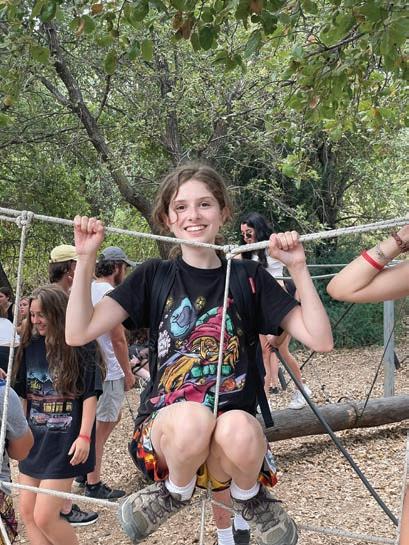
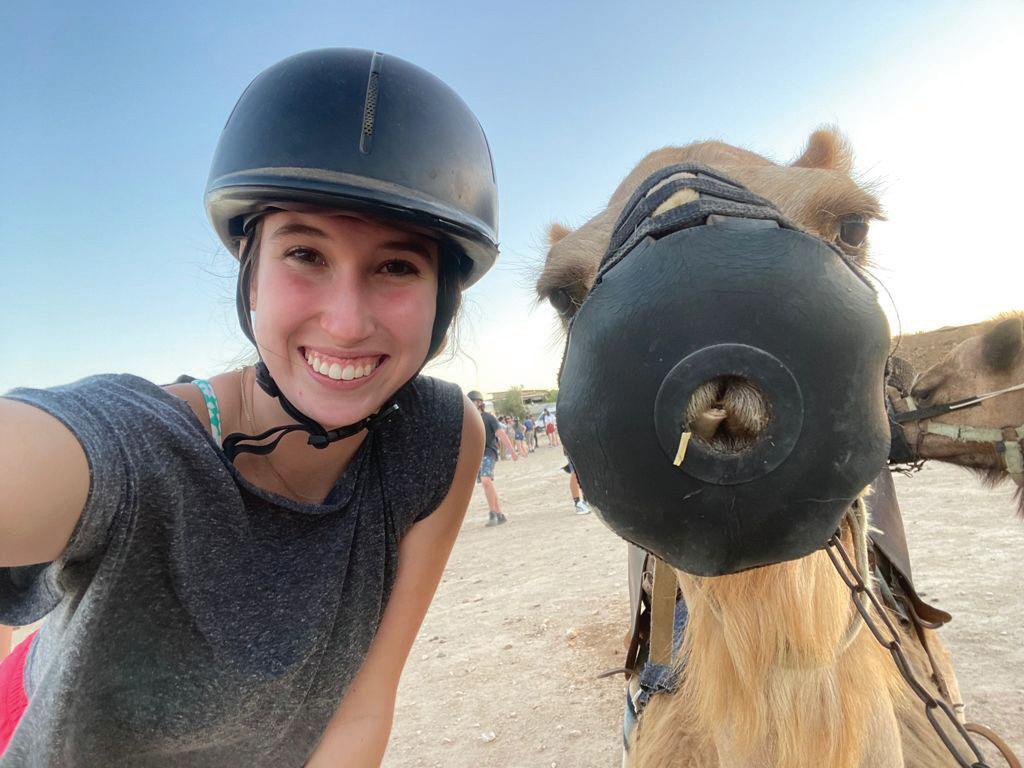
“I’ve always heard that Israel is such a special place and that you can’t describe the feeling. And as soon as I got there, I would 100% agree,” she said. “Walking in the streets and seeing all the rich Jewish history is so incredible. It’s a place where I felt so at home, even though
I was 7,000 miles away from my home.”
Cohen was supposed to go to Israel last year but the trip was canceled because of the pandemic.
Cohen appreciated learning about Israel and speaking directly to Israelis. She also enjoyed picking weeds, painting a bomb shelter and packing food for lower-income families.
A highlight was walking through the Old City. She didn’t realize Israel was such a special place to so many different kinds of people.
Hailey Weinzweig, 16, also went on the Roots Israel trip.
“When I was there, I just felt like I was being a good Jewish person. It was fulfilling and I felt complete and full.”
Weinzweig felt the experience made her more independent.
Jennifer Sosnow, JNF-USA’s Israel programs admissions director, said it is important for young Jews to go to Israel because the experience helps them form a stronger connection with their Judaism and, ultimately, helps combat antisemitism.
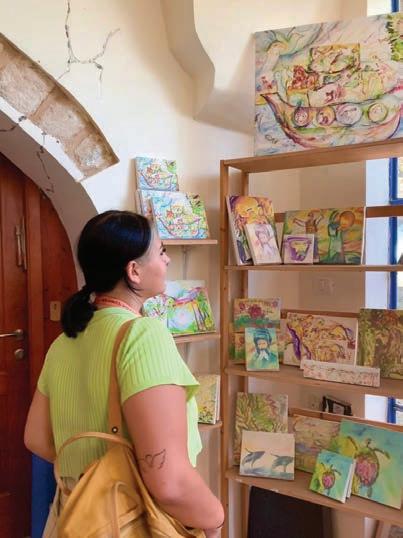
“From what I see, the teens that get involved early, the teens that are stepping up and joining Jewish organizations or traveling to Israel, or traveling to Poland and seeing Jewish sites and living a Jewish life are able to stand up and represent their Judaism in college,” where students are introduced to things like the Boycott, Divestment and Sanctions movement, she said.
In 2019, some 4.55 million tourists visited Israel, and the country’s tourism industry employed some 200,000 people, according to the Ministry of Tourism. But Israel closed nearly all entry to foreigners with the onset of the pandemic, and shut down its main airport earlier this year due to rising case numbers. The students returned just before case numbers began to rise again as a result of the delta variant.
The Centers for Disease Control and Prevention raised its COVID travel alert for Israel to its highest level on Monday, Aug. 9, and on Aug. 11, Israel implemented new pandemic-related restrictions. Those include the reinstatement of the so-called “green pass” requirement for entry into various venues and a mandatory seven-day quarantine from foreign travelers from several countries. The restrictions prompted Birthright to cancel its remaining 42 ten-day trips.
Hillel Newman, Consul General of Israel to the Pacific Southwest of the United States, said he is glad that student trips to Israel were able to resume at least over the summer. “Usually people come back as goodwill ambassadors on behalf of the State of Israel,” he told Jewish News. “I hope the group from Arizona feels the same, and more connected.”
Jews are more likely to preserve their Jewish identity if they have a strong connection to Israel, he said.
Morris loved his time in Israel, but what
two years on a Birthright trip.
Cohen, who wants to be an orthodontist, said she wants to study abroad in Israel during college.
Gilmartin said the trip sparked a curiosity in her about Judaism.
“Leaving this trip, I set some goals for
myself that I never would have before,” she said. She wants to pray in the morning when
ful for, and she wants to observe Shabbat more. She also wants to get more involved in CTeen.
“Whoever is considering this trip or just going to Israel in general, definitely go. Go with an open mind because it’s definitely worth it,” she said. JN
HEADLINES LOCAL 8 AUGUST 20, 2021 JEWISH NEWS JEWISHAZ.COM
Eleven chosen teens, including Hannah Gilmartin — in the back row third from left and Colin Morris, back row on right — meet with Israel President Isaac Herzog during CTeen’s Heritage Quest summer Israel trip.
Sydney Cohen in Israel with JNF-USA’s Roots Israel program. PHOTO COURTESY OF JENNIFER SOSNOW
Hannah Gilmartin looks at art in S’fat during CTeen’s Heritage Quest summer Israel trip.
PHOTO COURTESY OF HANNAH GILMARTIN
Hailey Weinzweig in Israel with JNF-USA’s Roots Israel program
PHOTO COURTESY OF JENNIFER SOSNOW
Greater Phoenix Board of Rabbis welcomes new president
Congregation Kehilla Rabbi Bonnie Sharfman was elected president of the Greater Phoenix Board of Rabbis for a two-year term.
She is working with BOR’s executive committee to flesh out a collective vision.
Sharfman said she wants BOR to be available as a resource which strengthens synagogues and Jewish organizations and

fosters more collaboration.
First and foremost the board is a professional association. “We’re here to support each other in terms of sharing information, ideas and resources,” she said. “We see ourselves also as being in a position to rise and respond to the needs of our community where and when we are needed.”
Her first move as president was the
CP Technologies celebrates grand opening in Prescott
Prescott has a new Israeli-owned tech company in town.
CP Technologies held a grand opening ceremony for its North American headquarters and manufacturing facility in June. The company designs and makes standard and custom rugged computer hardware.
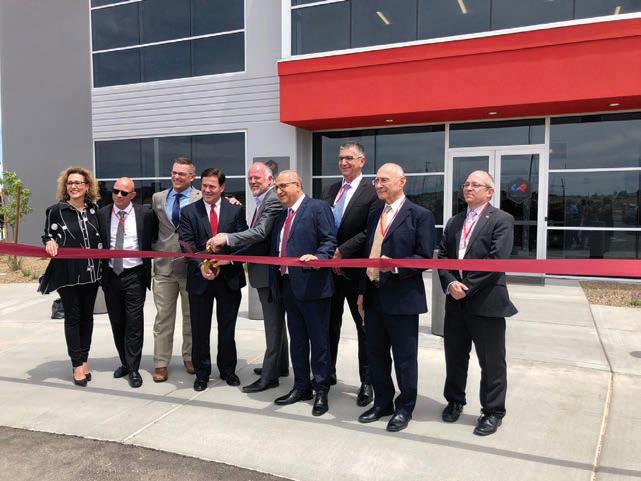
“We are proud to be a part of the outstanding technology and business community here in Arizona and are grateful for all the support we’ve received,” said Mike McCormack, CP Technologies president and CEO.
The company had called Southern California home for more than 20 years. In 2018, CP Technologies was acquired by Aeronautics
Ltd., an Israeli company owned by RAFAEL Advanced Defense Systems. Its focus on aviation is one reason that Prescott is an attractive site — Arizona is home to Yavapai College and an Embry-Riddle Aeronautical University campus.
Prescott Mayor Greg Mengarelli, Gov. Doug Ducey, Hillel Newman, Consul General of Israel to the Pacific Southwest of the United States and Leib Bolel, president and CEO of the Arizona Israel Technology Alliance, were among those who attended the grand opening ceremony.
“CP Technologies represents another exciting high-tech company that’s chosen to relocate its headquarters from California to Arizona,” Ducey said.
Phoenix Film Festival screens Holocaust documentary
“An Inconvenient Time: The Story of Ruth Ravina,” a documentary of one woman’s experience of survival, will be screened once a day Aug. 20-22 at the Phoenix Film Festival. Following each screening, there will be a live Q&A with Denny Klein, the film’s producer and director.
The festival runs for 11 days in August and screens over 300 films at Harkins Theatres Scottsdale 101.

Klein met Ruth Ravina, the subject of the film, through his daughters. When he heard her story, he wanted to put it on film. “I immediately knew that these collections of a young child were so unique
creation of a video that the board released June 9, encouraging the Jewish community to remember its heritage and to find strength during a time of increased antisemitism.
“At our first executive committee meet ing, we talked about how there was a very pervasive atmosphere of concern and anxi ety in the Jewish community — and this is

There is a lot going on between Israel and Arizona, Newman told Jewish News. He hinted that more Israeli companies will be on their way to Arizona.
“I can’t give names of com panies — I can just say there’s a lot of interest,” he said. Arizona is “on the map” for Israeli com panies looking to relocate because, among other things, “Arizona is trying to be the startup state and Israel is the startup nation.”
Arizona opened its first trade office in Israel last May and there are several organi-

and special it demanded to be filmed,” Klein said. “It was like G-d tapped me on the shoulder and said, ‘You have to do this.’”
Ravina was born two years before the Germans invaded Poland. She begins the documentary there and recounts her life story going forward. She emphasizes
a typical Board of Rabbis’ executive committee question: What can we do to help?”
The health of the Jewish community is very important to everybody who serves in Jewish communal life, she said.
“Economic diplomacy is a very important element in general,” Newman said. JN
kindness in the documentary. “Be kind, even when it’s not comfortable to be kind. Small kindnesses saved lives,” she told Klein.
Ravina shares her story with schools and synagogues.
Now that Holocaust education has been mandated for Arizona public schools, the
SEE BRIEFS, PAGE 23
HEADLINES LOCAL JEWISHAZ.COM JEWISH NEWS AUGUST 20, 2021 9 RESERVE YOUR AD TODAY! Contact Jodi Lipson at jlipson@jewishaz.com to schedule your advertising. The 33rd annual Jewish News Community Directory is a full-color magazine. This essential guide to community, businesses and professional resources will connect you to 15,000 readers, in print and online all year long. 2022 ANNUAL COMMUNITY DIRECTORY Publishing October 15, 2021 | Space Reservation – Sept. 2, 2021 Community Directory SPECIAL ISSUE $6 2021 Advertiser Bonuses • FREE 25-word listing • Resource/telephone index • Listing on Jewish News’ website, jewishaz.com, with links
OF
Ribbon cutting ceremony
PHOTO COURTESY
HILLEL NEWMAN
Solving the infrastructure puzzle
We all understand the need to invest in maintaining and upgrading our nation’s infrastructure. That includes work on such fundamentals like roads, bridges, transportation, water and energy distribution and the upgrade of communication networks, including the internet.
So when the Senate passed a $1 trillion infrastructure bill with bipartisan support that addressed many of those issues, most of us nodded in agreement. We did so even though we knew that there were some who sought a broader definition of infrastructure, and a much bigger plan — just as there were others who opposed the plan and were concerned about funding and deficit implications. The next day, however, Democratic senators (with no Republican support) passed another “infrastructure” bill for $3.5 trillion, in order to address a wide range of social needs. It could take months for Congress to work through the two bills, with no assurance at this time that sufficient votes exist to pass a blended measure.
The Biden administration and the Democratic Party are seeking to exploit a thin Democratic majority in the House and the vice president’s swing vote in a divided Senate to address pressing societal needs. Thus, the $3.5 trillion spending plan includes $726 billion to expand education opportunities, $198 billion toward clean energy, $20.5 billion in invest-
once and fails to give sufficient consideration to the financial implications of the overall undertaking.
That doesn’t mean that all of the programs should be abandoned. But it does suggest that a more comprehensive analysis of the financial ramifications of the expanded programming should be performed — including an honest
multiples of that number for a $3.5 trillion plan.
ments in Native communities, $18 billion to upgrade VA facilities, $332 billion toward housing affordability and so on. While each of these items is worthy, we worry that the all-inclusive approach seeks to do too much at
assessment of governmental revenue sources to pay for them. According to the Congressional Budget Office, the $1 trillion infrastructure package will add $256 billion to the federal deficit over the next decade. We cannot afford
Toward balance and well-being
Before the pandemic changed the way many of us work, we were forced to deal with an array of psychological stresses that added to the pressures of our work environments. From how employees reacted to their own illnesses to how they dealt with the varying needs of a child, parent or other loved one, our workforce was under stress.
Then came the pandemic, and a whole new level of stress. Although our masking, handwashing and social distancing helped conquer the traditional rampant spread of the common cold, the resulting isolation redefined our lives. Separation and loneliness caused a growing number of us to experience mounting anxiety and symptoms of depression as we struggled to adjust to an
ever-changing “new normal.” Many adults have had trouble sleeping or eating, and dealt with alcohol or substance abuse or worsening chronic conditions while they struggled to cope with various stresses caused by COVID19. Fortunately, from that depressing reality a ray of hope has emerged.
Our pandemic experience has changed the way many of us think about the importance of rest and self-care. This has caused an increasing number of us to focus on our own health and well-being, and that of those around us.
We are starting to recognize the importance of taking a break. And an increasing number of us now understand that prioritizing work over all else can not only hurt ourselves, but can also impact those around us. This
recognition has caused some employers to expand work-from-home options for many employees, whether on a regular or partial basis, thereby eliminating some elements of stress from various work environments. We are pleased to see growing employer concern and flexibility, but there is more work to be done. Even before the pandemic, there were mental health care shortages throughout the country, especially in rural areas. That shortage reportedly impacted more than a third of Americans, or 124 million people. And the situation has gotten worse during the pandemic. Moreover, just like actual recovery plays out differently for those recovering from COVID, so too the projected needs for those dealing with pandemic-related stress and
We are concerned that a one-party rush to the finish line could result in waste, mistakes and unintended consequences. Yet we recognize the limited window of opportunity and fraught internal challenge faced by the Democratic Party. That’s where the party’s standard bearer, President Joe Biden, can lead. As noted by Russell Berman in The Atlantic, “For Biden the good news is that he is a president particularly well suited to landing on the sweet spot for his party. If he had a singular talent over the course of nearly half a century in elected office, it was in finding the political center — not necessarily of the country as a whole, but of the Democratic Party.” If Biden wants to get his mega-plan through, he will have to guide Congress through a comprehensive analysis and presentation that minimizes waste, provides targeted solutions and makes clear how those ambitious initiatives will be funded. JN
other mental health needs could strain the mental health care system for years to come.
In the early days of the coronavirus threat we urged our readers to focus on their mental health — to eat well, exercise regularly and get enough sleep — in order to better cope with the anticipated stress of the pandemic. At the time, we had no idea how long the situation would last, or its impact on our collective well-being. And now, 17 months later, as we prepare for next month’s High Holidays, we have an opportunity to recommit to increase our focus on our own mental health needs and that of those around us. Let’s enter the new year with a heightened focus on the importance of peace of mind. JN
American immigrants who leave Israel don’t deserve disdain
RUTHIE BLUM | JNS
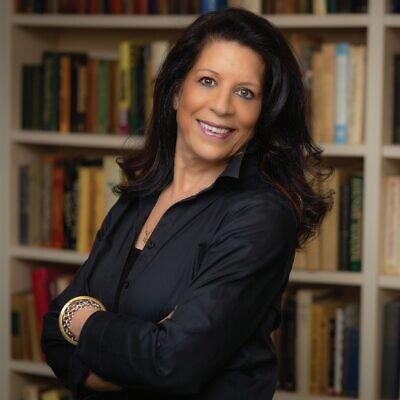
On the occasion of the 40th anniversary of his parents’ aliyah from the United States, Haaretz political correspondent
Chaim Levinson paid homage to his mother and father, who “left behind family, jobs that would have earned them much more money than they were paid [in Israel], more impressive careers and a house in the suburbs a few times the size of the stone building in Jerusalem where [they] settled.”
In an op-ed, he pointed out that while their immigration was “traumatic,” it was also a privilege for them to have relocated to Israel.
“We were fortunate to come,” he wrote. “There’s no place more natural for a Jew to live. Israel is home. Israel is the place and the destination. … Israel is, first and foremost,
A NOTE ON OPINION
a sense of belonging, of taking part in creating something. There’s no dual loyalty, no alienation. You don’t have to apologize for being Jewish. It’s the fulfillment of the vision of generation upon generation that my ancestors, unlike my parents, didn’t have the privilege to fulfill.”
SEE BLUM, PAGE 12
We are a diverse community. The views expressed in the signed opinion columns and letters to the editor published in the Jewish News are those of the authors. They do not necessarily reflect the views of the officers and boards of the Jewish Community Foundation, Mid-Atlantic Media or the staff of the Jewish News. Letters must respond to content published by the Jewish News and should be a maximum of 200 words. They may be edited for space and clarity. Unsigned letters will not be published. Letters and op-ed submissions should be sent to editor@jewishaz.com.
OPINION
Editorials
10 AUGUST 20, 2021 JEWISH NEWS JEWISHAZ.COM
"IF BIDEN HAD A SINGULAR TALENT OVER THE COURSE OF NEARLY HALF A CENTURY IN ELECTED OFFICE, IT WAS IN FINDING THE POLITICAL CENTER"
Commentary
My surprising Jewish family tree
MICHELLE TALSMA EVERSON
few months ago, my fatherin-law was thumbing through my son’s new book about Judaism, which my aunt had sent him. That same weekend I was invited to a virtual seder with more than 20 people from across the United States and Israel. It might seem ordinary to some, but for me, it was an odd, ironic weekend. My father-inlaw is Christian, and it was Easter. A few weeks earlier, as my son looked forward to his Easter basket, my sister was explaining to me the basics of what a seder even is.
In late March, my identity changed forever. One night, I went to bed an only child with two parents who had both passed over a decade ago, and I woke up something else completely.
I, like millions of Americans, did an at-home DNA test. In fact, I did two: Ancestry.com and 23 and Me. I was in search of something. On a health kick for 2021, I had started yoga, seeing a therapist and addressing mental health issues. A part of that health journey meant answering a question I’ve always had: Do I have siblings out there?
I was raised the only child of parents who passed when I was 22 (my mom) and 24 (my dad). I had my now-11-year-old son at 23, right in between. Yes, it was as jarring as it sounds.
AGrowing up, my dad mentioned now and then that he had other children “out there,” but to never go looking. I respected his wishes while he was living, but at 35, I wanted to know. I was (supposedly) ready for whatever came back from spitting in that tube. In fact, I was even in touch with the man I thought was my half brother — the test was only going to prove that.
Funny story though: I was not ready. You never are ready when your world turns upside down.
The e-mail from 23 and Me came in first.
I paused, then opened the app. First, not a match with my half brother — I guess he must not be my dad’s son. I’ll have to break the news to him. Awkward.
Half of the circle made sense: one quarter “native to Mexico” and one quarter Spanish, the mix that usually signifies those of Mexican American descent, like my mom, and my cousin, who was a match. The right-hand side of the circle though was green: Ashkenazi Jewish. And a woman was listed as my aunt. My dad had only brothers and my mom’s sisters hadn’t taken any DNA tests.
I screenshot the results and sent them to my best friend. It took me a few minutes to put it together, and he was patient as I did. My dad who raised me wasn’t my biological dad. I was left speechless. Every emotion hit me at once and left me breathless. Time and space lost meaning. Nothing seemed solid or real.
I didn’t know it at the time, but what I just experienced has a name: NPE, not parent expected.
“NPE is a term used in the genealogical community to identify an anomaly on a family tree where the assumed parent was proven, through a DNA test, to NOT be the biological parent,” according to NPE Friends Fellowship, a national nonprofit, which offers resources and online support to those impacted by this occurrence.
More than four months later, while most of the puzzle pieces have come together, some mysteries remain and likely always will given that I can’t ask either parent for the full story.
The names and identities of the people I matched with don’t matter. What matters is that I found my biological father differed from the man I knew to be my father. And, I found new family, Jewish family. They identify both as culturally and religiously Jewish, although they practice to varying degrees. So far, it’s been an emotional, challenging, sad, happy — all of the things really — journey.
I’ve met my half sister in person, and that was amazing. I’ve added new social media connections. I’ve texted. Since my biological dad is Jewish and not my mom, it depends on whom you ask whether or not I am considered truly Jewish — but given that I didn’t know any of this until the age of 35 — I consider myself half Hispanic and half Jewish. My son is a quarter Jewish. We’re on the journey
Join me in the fight against antisemitism
RACHEL HOFFER

ome things are hard to believe even when they are happening right in front of your eyes. Looking out from behind the podium in a Hyatt Regency ballroom in Washington, D.C., on July 20, I almost had to pinch myself. The 250 people gathered were members and alumni of Jewish Federation of North America’s “Cabinet Activation against Antisemitism,” who had mobilized to learn how to combat antisemitism. As I spoke to the gathering about my family’s commitment to Judaism, I displayed a photo, snapped by my daughter, of her younger sister lighting Shabbat candles. The photo was once displayed at the ANU Museum of the Jewish People in Tel Aviv.
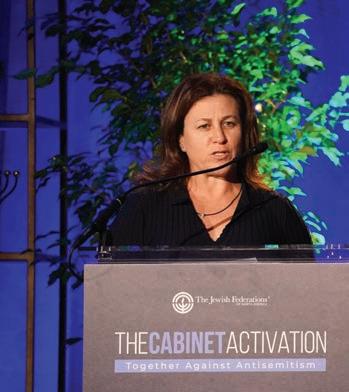
Standing there, I felt a mixture of sadness and pride. Because of the COVID-19 pandemic, it had been a long time since I was in such a large crowd, and it felt a
bit surreal.
Antisemitism is also something that we are not used to, which may make it hard to believe that we are facing such a clear and present danger throughout the land.
My dad, Martin Pear, was an executive at a series of Jewish Community Centers, first in Worcester, Massachusetts, then in Binghamton, Tampa and finally, Phoenix. I grew up in a number of different Jewish communities at a time when antisemitic attacks and other incidents were relatively rare.
Now, synagogues and Chabad houses right here in Arizona are being vandalized with swastikas and rocks thrown through their windows, and a doctor at the Phoenix Children’s Hospital posted hateful and dangerous remarks directed at Israel and its people on social media.
I worry about both our safety and about our freedom to practice Judaism openly and joyfully.
That’s why the JFNA’s Cabinet was so important. It was gratifying to hear from almost a dozen members of Congress,
some of whom are Cabinet alumni, including Kathy Manning from North Carolina, Ted Deutch from Florida and Brad Schneider from Illinois. It reassured me that we have Jewish support from the highest levels of our government and that we’re all indeed standing together.
Tova Ricardo, a young female poet from Oakland, recited a lyrical poem, “black palm and honey voice,” that moved me to tears and highlighted the strength of our younger generation. Liz Schrayer, who led Cabinet’s Washington conference over two decades ago, donned a beautiful tallit as she told us that our time is now, that we need to move from being listeners to being leaders.
Of all the amazing speakers, one panel that was especially powerful was comprised of a group of student leaders who are fighting back against antisemitism on campus. These students are not sitting idly by; they are educating themselves and others, celebrating their Judaism and safeguarding the rights of others to practice their Judaism, too.
together and he knows everything I do, for better or worse. (If this ever happens to you, you’ll realize there is no playbook.)
When it all started, I was going to dive deep into learning about Judaism and its history. Could I still be Christian while learning about this new, rich culture and faith? Realizing this is a marathon and not a sprint, I’m taking it slow.
Initially, I didn’t take into consideration what a jolt to my system this would be — and still is, every day. My focus now is on making sure I’m OK, mentally and emotionally. As a mom, my son’s emotional and mental health is my priority as well. So, I am getting to know my newfound family members who are comfortable with getting to know me, too, while still balancing and appreciating my family of origin and amazing friends.
I’ve done some online searches and asked some questions. When I’ve found my center a bit more, I will do more research. I plan to remain a Christian, but I’d also like to have basic knowledge of this side of me too — for my son and myself. So far, I know that during the holidays, we’ll be placing a menorah alongside the Christmas tree.
Besides that, like every journey worth taking, it’s one step at a time. JN
The conference ended on a rooftop overlooking the U.S. Capitol. We gazed at a panoramic view of the city and sang “Am Yisrael Chai” (“The People of Israel Live”). Eric Fingerhut, the CEO of JFNA, spoke about Freedom Sunday for Soviet Jews, a rally in December of 1987, which drew 250,000 people to Washington. While our conference had only 250 attendees, he said our job was to go back to our home communities and recruit others to join the fight against antisemitism.
“Our civil society, the bedrock of our belonging, must be protected and preserved,” Fingerhut declared. “It’s our turn. It’s our watch. We’re on duty. We’re shomrim Yisrael — guardians of the People Israel.”
One of our key calls to action is already being implemented. Melissa Rogers, the executive director of the White House Office of Faith-Based and Neighborhood Partnerships, told us at the conference that President Joe Biden would soon nominate
Michelle Talsma Everson is a local editor, writer and PR pro. Her work can be seen at mteverson.com.
OPINION Commentary SEE HOFFER, PAGE 12 JEWISHAZ.COM JEWISH NEWS AUGUST 20, 2021 11
Pushing the philanthropic envelope
n his Wall Street Journal column, behavioral economist Dan Ariely once addressed a reader’s question regarding perks like address labels and notepads that charities send in their solicitation mailings to potential donors. Ariely asserted that charities are better off skipping these perks since they raise the question in donors’ minds whether these items are worth the amount they would potentially contribute.
Charity is more often dispersed due to an alignment of values. Both experience and logic suggest that we generally contribute to causes that we relate to and believe in. The condemnation of Ammon and Moab in this week’s Torah reading counterintuitively challenges us to rethink this approach to philanthropy.
The Torah criticizes the nations of Ammon and Moab because when the Children of Israel were wandering around the desert for
BLUM
CONTINUED FROM PAGE 11
He continued, “Israel is family. You feel a sense of closeness even with complete strangers. It’s oppressive, but also loving. … It stirs emotions. It causes joy in times of beauty and pain in times of darkness.”
As a former New Yorker who just celebrated 44 years in Israel, I couldn’t agree more with his description and sentiment. Sadly, the point of his piece—titled “Israelis Who Move Back to America Gain in Money and Lose in Soul”—was to criticize those who tried to make a go of it in the Holy Land, yet ended up returning from whence they came.
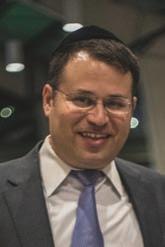
Rather than view them with empathy— or at least acknowledge their right as individuals to exercise personal choice—he adopts a disdainful attitude.
“In the summer, when the olim [immigrants] who returned to the United States come to visit [Israel], the shame of failure is slowly replaced by the pride of success, of talk of how much better their life is in America than it was here,” he stated. “Guilt feelings are exchanged for a fat wallet. They pay half what we do for an iPhone, a river runs past their house, they have money in hedge funds, a summer home at Virginia Beach, and they eat bagels with lox and cream cheese at the
40 years, these nations “did not greet you with food and water on the way, when you left Egypt.” (Devarim 23:5) One may be forgiven for assuming that Ammon and Moab erred by callously ignoring the pleas of the seemingly interminably wandering Jewish people who were desperate for a morsel of food to relieve their hunger pangs and a sip of water to moisten their parched throats.
IThe Rabbis of Midrash Rabbah (circa 400650 CE), on the other hand, deftly place the refusal of Ammon and Moab to help in the context of what we know about the comfortable living conditions of the Israelites in the desert. It cites the refusal of Ammon and Moab in contrast with Abrahamic philanthropy: giving to recipients that do not need assistance.
It says: Who was generous even with those that did not require assistance? Avraham [who fed angelic messengers who do not require food]. Who was not generous with those that do not require assistance? Ammon and Moab with the Israelites, as it says, “they did not greet you with food and water…”
Did the Israelites need them? All of the 40 years that [they] were in the desert, the Manna came down for them, the Well [of Miriam]
appeared, quail was plentiful, the Clouds of Glory surrounded them and the Pillar of Cloud navigated in front. Rather, it is common courtesy: when someone arrives after a journey, you offer them food and drink.
According to this perspective, Ammon and Moab were not criticized for failure to provide essential food and drink to a needy nation. They were censured for failing to provide something that was not at all necessary because they paid no heed to basic decency which dictated that they should provide it or at least offer it anyway.
The idea of giving when we think the recipient does not or should not need our help challenges the limits of our empathy. Most philanthropy and chesed is performed with causes that we relate to and identify with, and with recipients with an evident need.
We sometimes, however, encounter opportunities to assist legitimate causes that are filling a personal or communal need but are less relatable to us on a personal level, are associated with different parts of the community or are outside of our social circle. In these situations, there is often an understandable and natural hesitancy to provide something that, from our
AUG. 20 - 6:50 P.M.
AUG. 27 - 6:42 P.M.
AUG. 21 - 7:45 P.M.
AUG. 28 - 7:36 P.M.
perspective, the recipients might not need or should do without.
The Torah’s unfavorable reaction to the uncharitable way of Ammon and Moab suggests that the Jewish way is to follow Abraham and Sarah’s example by moving beyond our reservations and pushing the limits of our giving. As Elul begins and Rosh Hashanah approaches while the acute economic shock waves of COVID-19 continue, there is no better time to expand, to this additional dimension, our empathy, our giving and our generosity. JN
annual conference of the JCC Association of North America.”
Adding insult to injury, he went on: “So what? … If I worked for The New York Times, I’d earn 10 times what I do today. But I would be at The New York Times, not Haaretz. Money can buy a lot of things, but not soul and spirit.”
He concludes by claiming that he hasn’t “met anyone who has returned to
ups, downs and a populace engaged in the typical daily grind of going to work and running errands, while seeped in concerns common to all human beings. Zionism may serve as a comfort when such burdens loom large, but it can’t be taken to the bank, literally or figuratively.
Furthermore, not all immigrants fall head over heels when they first arrive, or develop a deep, committed love as time passes. For some, a lack of proficiency in Hebrew is sufficient cause for second thoughts, if not the desire to pack their bags and head for the airport.
HOFFER
CONTINUED FROM PAGE 12
the State Department’s Special Envoy to Combat and Monitor Anti-Semitism. Naming someone to this office had been a major focus of JFNA’s lobbying efforts. Just a week later, the president chose Deborah Lipstadt of Emory University, a former Cabinet member, for that crucial position.
But we continue to activate and advocate. Now we are asking that the federal Nonprofit Security Grant Program, currently $180 million a year, be doubled in the 2022 fiscal year to $360 million, to protect synagogues and other nonprofits from the threat of domestic terrorism.
America and whose return has expanded his or her soul the way the soul expands when you lie in your bed at home in Israel.”
It’s the height of arrogance to assert knowledge of what goes on in other people’s souls. But Levinson has opened a window into his own, revealing a bowlful of sour grapes. Anyone who loves Israel for what it is, and accepts it for what it isn’t, need not begrudge a fellow Jew for feeling differently.
The Jewish state, as a genuinely rewarding—and fun—place to live, is an actual country. It’s a breathing organism with
To minimize the internal struggle that leads certain olim to reverse course is unfair. To attribute their change of heart to “summer homes at Virginia Beach” and “bagels with lox at the annual JCC conference” is not only nasty; it shows an absence of compassion. And making sarcastic remarks about “fat wallets” and “hedge funds” is a sure sign of envy.
If Levinson considers living in Israel to be worth more than millions, then his gratitude ought to be outweighing his resentment. JN
I couldn’t help thinking back to other “National Young Leadership Cabinet” conferences I had attended: from Tbilisi, Georgia to Berlin, Germany, to Casablanca, Morocco. Those had all included everyone getting up to dance. This one, with COVID in the backdrop and more somber in purpose, did not. I missed being able to join hands in a hora, but I understood that this was perhaps less a moment of celebration than of dedication to a long battle ahead.
We all made a commitment on July 20, to share this message and inspire our communities. As a collective, we will fight against antisemitism and soon we will dance again.
RELIGIOUS LIFE TORAH STUDY
Rabbi Yisroel Isaacs is director of the Greater Phoenix Vaad Hakashruth, rabbi at Beth Joseph Congregation and director of the Jewish Enrichment Center.
Find area congregations at jewishaz.com, where you can also find our 2021 Community Directory.
SHABBAT CANDLE LIGHTING
SHABBAT ENDS
12 AUGUST 20, 2021 JEWISH NEWS JEWISHAZ.COM
RABBI YISROEL ISAACS PARSHAH KI TEITZEI DEUTERONOMY 21:10-25:19
JN
Rachel Hoffer is the former co-chair of Jewish Federation of North America’s National Young Leadership Cabinet and current co-chair of National Young Leadership Strategic Growth and Engagement.
Ruthie Blum is an Israel-based journalist.
NOT ALL IMMIGRANTS FALL HEAD OVER HEELS WHEN THEY FIRST ARRIVE, OR DEVELOP A DEEP, COMMITTED LOVE AS TIME PASSES.
Rosh Hashanah worldwide
 PAUL ROCKOWER
PAUL ROCKOWER
Ihave always been interested in the global Jewish community. My senior year at Brandeis University, I lived in a suite with a Colombian Jew, Russian Jew and Turkish Jew, and our friends were Jews from Mexico, France, Israel and Brazil. This diversity of Jewry piqued my interest, and later I would go on to write a column for the Jerusalem Post called “Tales of a Wandering Jew” about Jewish communities in far-flung places. Prior to settling in Phoenix for my position as the executive director of the Jewish Community Relations Council of Greater Phoenix, I lived quite the nomadic lifestyle. For many years, I traveled all around the world running cultural diplomacy programs and I had no fixed address. As such, I got to spend many High Holidays in a lot of random spots. I have celebrated Rosh Hashanah in places as varied as Antwerp and Brussels, Buenos Aires and Mexico City. Thanks to these cultural exchanges, I had the opportunity to see how the Jewish world celebrates our shared celebrations with cultural nuances that shaped the holidays.

There was one year where I was running a hip hop diplomacy program in Bosnia, and I spent Rosh Hashanah services in Sarajevo, where the services were
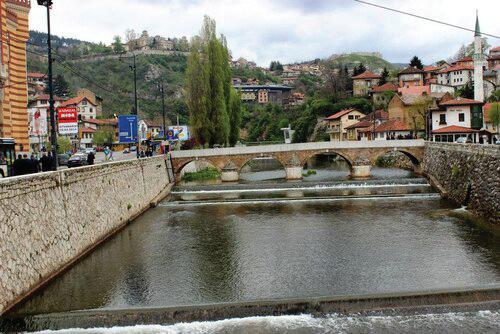
dinner. As we celebrated the holiday together, after singing “Henai Ma Tov,” everyone broke out in a chorus of “Aux Champs-Elysées.”
at the Sheraton Hotel, I looked down the long metro car and thought to myself: nobody on the entire train knows that it is Rosh Hashanah.
We believe this to be the day of inscription into the Book of Life, but what if no one knows it. If a tree falls in the forest…. I wondered what it mattered if such days pass by humanity unnoticed like dust. But I entered the Sheraton Hotel roomturned-shul, and I was the tenth person to create the ceremonial minyan. My answer was that it matters if only ten are aware.
held in a tri-lingual fashion, in Bosnian, Hebrew and Ladino. There was another year that I celebrated Rosh Hashanah in Toulouse, France, where the congregation held a Rosh Hashanah meal together after the French-Hebrew service. The communal meal had the best kosher wine ever, and there was a stinky cheese course to the
One year, I found myself in Taipei, Taiwan for the High Holidays. With no chance to find anything resembling mom’s brisket for my Erev Rosh Hashanah meal, I opted for the closest similar dish: Taiwanese beef-noodle soup. The next morning, as I took the metro down to the Shandao Temple station for Rosh Hashanah services that took place
High HolidaysTRADITIONS
DINNERS FOR RoshHashanah
Available September 6 from 11am - 7pm
Inquireaboutdelivery


Please reserve orders for 6 or more bySeptember3
BraisedBeefBrisket$22 per person
GrilledSalmonor
RoastedChickenBreast$1899 per person
MealsInclude: Roasted Red Potatoes, Carrot Tzimmes, and 1-pint Matzo Ball Soup
USDAChoiceCenterCut BeefBrisketFlat
$9.99 lb save$3lb
Price valid September 1-7, 2021
Reserve yours in the Butcher’sCorner
ajsfinefoods.com
The thing I take away from my experiences getting to celebrate Rosh Hashanah in so many varied places is that the festivities of the Jewish New Year is one of underlying threads that ties the Jewish community together, the whole world over. Some of the customs are familiar, some are foreign but all the elements help shape the richness of the Jewish experience that connects us together. JN
Paul Rockower is executive director of Jewish Community Relations Council of Greater Phoenix. This article first appeared on jewphx.com.
Order by September 12

THE BAGEL TRAY
$25 serves 12 save$5
Assorted Bagels with cream cheese, butter, jams & jellies.
THE BAGEL NOSH
$72 serves 8 save$10
Bagels complemented with cream cheese, Nova Salmon, capers, lemon wedges and sliced tomatoes & onions.
POACHED SALMON
$85 serves 8-10 save$15
Whole Salmon fillet served cold with AJ’s Cucumber Dill sauce.
save$5onany
FRESH FRUIT TRAY
A bountiful assortment of fresh seasonal fruit.

$25 Small serves 6-10
$35 Medium serves 12-14
$45 Large serves 16-20
save$5onany
MINI DESSERT TRAY
Sumptuous mini pastries and dessert bars.
$40 Small serves 10
$55 Medium serves 16
$65 Large serves 20
AVAILABLE BY THE POUND
• Chopped Chicken Liver
• Nova Salmon
• Whitefish Salad
Prices valid through September 16, 2021
JEWISHAZ.COM JEWISH NEWS AUGUST 20, 2021 13
ROSH HASHANAH SPECIAL SECTION
Ask our Cellar Masters about our Kosher wine selections.
withPlattersfromAJ’sBistro
YomKippurBreak-the-Fast
View of Taipei, Taiwan PHOTOS BY PAUL ROCKOWER
View of Sarajevo, Bosnia
Not your average kugel
JENNIFER STARRETT | CONTRIBUTING WRITER
Before the High Holidays last year, I reached out to community members for their favorite recipes to include in my Community Eats collection. I wasn’t surprised that kugel, an Ashkenazi Jewish baked pudding or casserole, was one of the most popular types of food submitted. While most of the recipes did use traditional
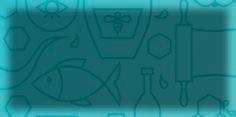

PESTO KUGEL
ingredients like egg noodles or potato, I was interested to find that no recipe was exactly like the next.
Each kugel recipe used slightly different ingredients and twists, including dairy versions, sweet fruit-filled noodle kugels or savory versions loaded with vegetables. These favorite kugel recipes were shared
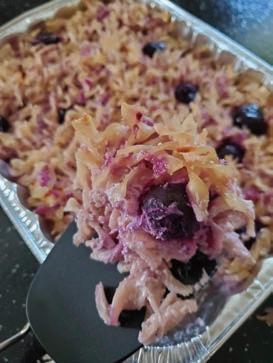
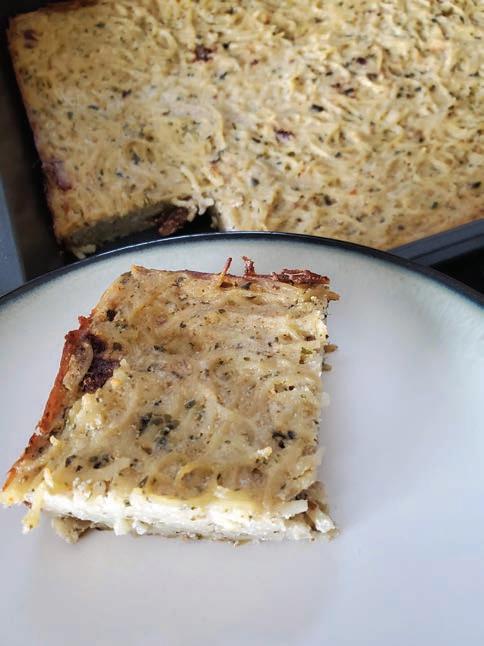

I love pesto and this unique kugel highlights the basil and garlic flavors perfectly. This kugel could be served with a side salad, or easily be spotlighted as a main dish. It’s full of flavor and will fill you up, and it’s also something very unique in the world of kugels.
INGREDIENTS:
12 ounces thin egg noodles
7 ounces pesto sauce
15 ounces ricotta cheese
2 eggs
¼ cup sun-dried tomatoes, chopped
½ teaspoon garlic powder
Salt and pepper, to taste
Cook and drain noodles per directions on package and set aside to cool. Preheat the oven to 350 F and spray a 9-by13-inch pan with cooking spray. In a large bowl, combine the
for many years in homes around our community, and I hope they were enjoyed in new homes after the collection was available.
Kugel is a classic for a reason and many cooks serve their own version during the holidays. This year, I wanted to create a few of my own twists on the traditional kugel and serve up new flavors which bring a bit of
POTATO, ZUCCHINI CARROT KUGEL CUPCAKES
Part of the fun of this recipe is the use of muffin tins rather than the traditional casserole dish. The colors from the carrots and zucchini also make these kugel cupcakes extra fun to serve, and I’m sure you’ll get lots of compliments on the look as well as the taste.
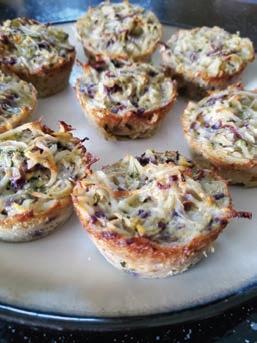
I make these for many of the Jewish holidays throughout the year and really enjoy the added sweetness from the carrots and how nicely they complement the earthy flavors of the potato and zucchini.
INGREDIENTS:
3 small to medium size potatoes, washed and peeled
2 small zucchini, washed (peel optional)
4 medium carrots, washed and peeled (use rainbow carrots for extra color)
¼ red onion
¼ cup oil
2 eggs
¼ cup flour
1 teaspoon sugar
½ teaspoon onion powder
Salt and pepper, to taste
Grate the potato, zucchini, carrots and onion in a food processor or by hand. Let sit in a colander to drain excess liquids for about 20-30 minutes. Preheat the oven to 350 F and spray two muffin pans with cooking spray.
In a large bowl, whisk together the oil, eggs, flour, sugar, onion powder and salt and pepper. Squeeze out any additional liquids from the grated vegetables and add to the mixture in the bowl.
Once thoroughly mixed, divide mixture into the muffin tins, and be sure not to overfill.
Bake for 40 minutes until browned. Remove from oven and let sit for 5 minutes before taking out of the muffin tins and serving.
We are a reform congregation located in the Southeast Valley.



the second Friday at 7pm with an Oneg Shabbat following the service.
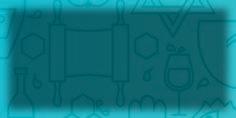


Our congregation o ers a sisterhood, a men’s club, an Israel group and a singles’ club.
Our Rabbi and Cantor o er Bar and Bat Mitzvah classes as well as adult education.
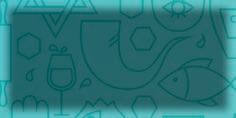








There is also a beautiful choir, and on Yom Kippur we have a cellist from the Phoenix Symphony to add to the meaningfulness of the service.
Our annual dues are $175 pp, including high holiday tickets. For more information, please call or email Marilyn Koss, membership chair, at 480-940-1916 or marilynjoe@cox.net
excitement to the table. The three delicious recipes are new favorites in our home, and I can see myself making them more often than just during the High Holidays.
Jennifer Starrett is an events and marketing consultant. Visit jewphx.com, for more of her recipes and blogs.
AMBROSIA KUGEL
Sweet noodle kugels are one of my favorite things about breaking the fast after Yom Kippur, but the flavors in this version are quite different than the ones I usually enjoy. I love how tropical this dish tastes and how nicely the coconut compliments the fruit. If you like ambrosia salad, I highly advise you to test out this kugel this holiday season. I think it will become a new favorite.
INGREDIENTS:
1 pound wide egg noodles
1 ½ cups cherries, pitted

16 ounces crushed pineapple, in juice
1 cup unsweetened Greek yogurt
(*substitute dairy-free sour cream to make parve)
1 teaspoon vanilla extract
2 eggs
¾ cup sugar
½ cup finely shredded unsweetened coconut
Cook and drain noodles per directions on package and set aside to cool. Preheat the oven to 350 F and spray a 9-by13-inch pan with cooking spray.
In a large bowl, combine the cherries, pineapple (with juice), yogurt and vanilla and mix until fully combined. Stir in the eggs and sugar, and then add in the cooked, roomtemperature noodles.
Fold in the shredded coconut and pour contents into the baking pan.
Bake for 40 minutes. Remove from oven and let cool for at least 10 minutes before serving or keep in the fridge until ready to eat and serve the dish chilled.
JN
14 AUGUST 20, 2021 JEWISH NEWS JEWISHAZ.COM ROSH HASHANAH SPECIAL SECTION Welcome to
–
the
SUN LAKES JEWISH CONGREGATION
Celebrate Rosh Hashana with Rango Honey.
you a happy, healthy and sweet new year! BE A FAN! follow us! - find- onFACEBOOK facebook.com/JewishAZ - andTWITTER twitter.com/phxjnews
Wishing
ALL PHOTOS BY JENNIFER STARRETT
Will the delta variant spoil the High Holiday comeback?
Just as things were returning to normal, and rabbis across America were eagerly anticipating a full reopening for the High Holy Days, the delta variant showed up.


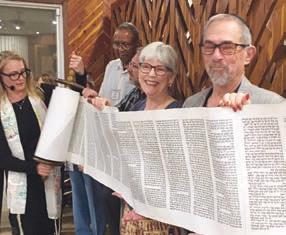

Oh no, not again.
Need I remind you that nearly every synagogue and Jewish center in America pretty much shut down during last year’s High Holidays because of COVID-19? That the great American Jewish ritual of scoring High Holiday tickets succumbed to a deadly, global virus? That rabbis had to scramble for alternatives, from Zoom services to backyard minyans?
Those days of physical isolation were supposed to be behind us. As Roni Caryn Rabin writes in The New York Times, “The country seemed to be exiting the pandemic; barely a month ago, a sense of celebration was palpable.” But now? “Rising case rates are upending plans for school and workplace reopenings, and threatening another wave of infections that may overwhelm hospitals in many communities.”
pews? How many will renew their memberships? Will new habits formed during the pandemic take over? After two years of unprecedented COVID disruptions, these are worrying questions.
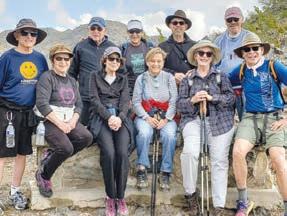
It’s easy to expound on new-age ideas like “creative reimagining” and “creative disruption,” but right now, the hard reality is that many congregations depend on the High Holiday season for significant fundraising. They already took a big hit last year — can they withstand another one?
Online alternatives may be incredibly efficient and comfortable, but when so much is available for free, there’s less incentive to pay or donate. The in-person experience, which has dominated Jewish life since time immemorial, has concrete value. A live appeal from a rabbi, needless to say, is a lot more powerful than an online one.
And yet, this is the new reality in which we find ourselves, for better or worse. Enclosed indoor spaces of all kinds have gone out of fashion. And that includes synagogues. As long as mask mandates are around, and alternatives are available, many people will see these indoor spaces as an inconvenient risk not worth taking.
Andra Karnofsky

We thought the vaccine would be our salvation, but according to reports, the Centers for Disease Control and Prevention is expected to recommend this week that even people vaccinated for the coronavirus resume wearing masks indoors in certain parts of the country.
Of the many obstacles to in-person prayer services caused by COVID, one of the toughest is surely the mask mandate. How many people will tolerate wearing masks during the long Rosh Hashanah and Yom Kippur services? It’s one thing to wear a mask while you go grocery shopping or briefly enter a public space, but when more pleasant alternatives are easily available — either via online or in someone’s backyard — how many Jews will brave the unintended indignity of covering one’s face during our holiest days of the year?
As I write this, the anxiety of uncertainty is building: If the mask mandates continue, how many Jews will grace the
I hope this doesn’t last. Prolonged physical isolation can be debilitating, especially for communities that are used to mingling and interacting and connecting in person. Regardless of how creative and impactful we’ve been with online programming, there’s simply no substitute for gathering in a real space, for hugging your friends, for making eye contact, for feeling the electricity of communal prayer, for hearing a live inspirational sermon.
I hope community members, and especially major donors, will step up and keep our most vulnerable synagogues afloat until safer days are back. Yes, Jews are supposed to be resilient, but sometimes the price of that resiliency can be quite high, in more ways than one. JN
JEWISHAZ.COM JEWISH NEWS AUGUST 20, 2021 15 ROSH HASHANAH SPECIAL SECTION 3535 E. Lincoln Drive • Paradise Valley (Sanctuary in Palo Cristi Church) www.bethamitemple.org (602)956-0805 BETH AMI TEMPLE Couples, singles, winter visitors ... Over 50 and looking to connect with YOUR Jewish background? No Building Fund Modest Dues A congregation of involved adults Travel – Hiking – Cultural Outings – Movies Speakers – Concerts – Torah Study and more IN-PERSON HIGH HOLIDAY SERVICES Singles $125 Family $250 (ticket cost can be applied to membership) Email for Reservations • bethamitemple@hotmail.com (attendees must be vaccinated) VISIT OUR VIRTUAL OPEN HOUSE at www.bethamitemple.org (any time after 2:00 PM on August 27) Meet Rabbi Allison Lawton and Cantorial Soloist Michael Robbins JOIN US FOR HIGH HOLY DAYS 5782 Send a Special High Holiday Greeting HEAVENLY HALLAH by
Giftpack includes 1 lb. sweet, whole wheat or traditional white round hallah with or without golden raisins, 8 oz. jar of golden honey, a shiny red apple and a personalized New Year’s card. $29 (includes shipping) call: 888-520-9080 email: sales@challah.com online: www.heavenlyhallah.com
DAVID SUISSA | JNS
David Suissa is editor-in-chief and publisher of Tribe Media Corp, and Jewish Journal, where this article first appeared.
PROLONGED PHYSICAL ISOLATION CAN BE DEBILITATING, ESPECIALLY FOR COMMUNITIES THAT ARE USED TO MINGLING AND INTERACTING AND CONNECTING IN PERSON.
Zachary Kepes breaks down Arizona’s housing market
NICOLE RAZ | STAFF WRITER
Zachary Kepes has seen the Phoenix-area housing market through many ups and downs, since entering the market in 2002.
Kepes, of Zak Ventures LLC, buys remodeled houses below market value to rent out or sell to individuals or investment institutions, like real estate investment trusts or hedge funds. He’s currently renting out 200 homes.
He described this past year’s housing market as “insanity.” Nationally, the median home price reached a record high of $363,300 in June, up 23.4% from a year earlier, according to the National Association of Realtors. Even so, the rate of appreciation is slowing down, and Kepes said the market is “cooling.”
Kepes started buying houses in 2009 after the housing market collapsed. Lenders were not interested in real estate at the time, so Kepes raised capital from investors and “put everything I could into this market as quickly as possible.” He built up a sizable portfolio and eventually paid off all the investors.
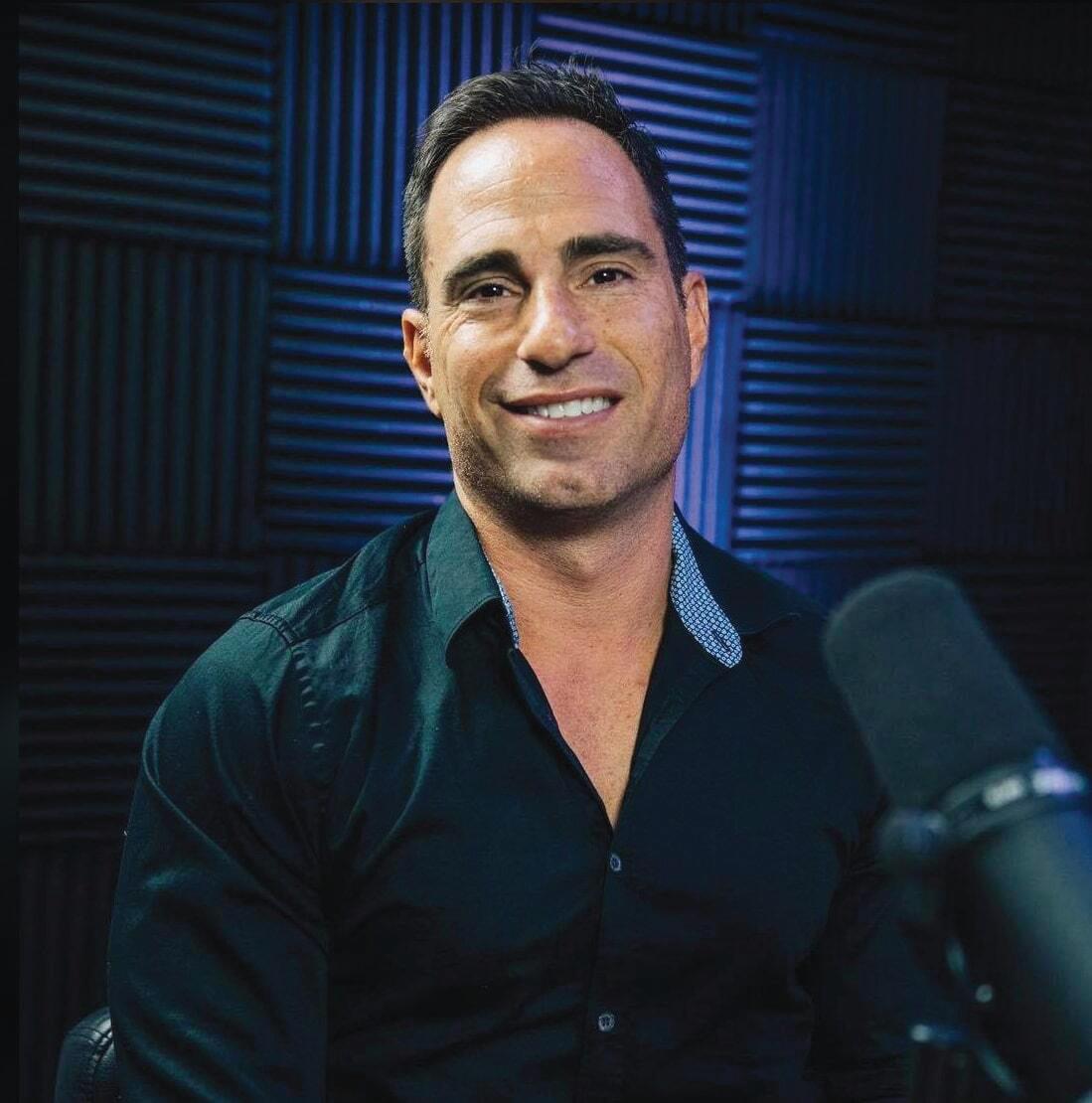
Kepes is also a founding member of Young Jewish Funders of Arizona. “It’s important to remember my roots and always give back,” he said.
Kepes spoke with Jewish News about the Phoenix real estate market and what buyers, sellers and renters need to know.
Where is the housing market at right now?

We’re still a very good marketplace and healthy in terms of inventory. And it’s



























still very much a seller’s market, but it’s certainly cooling. We’re not seeing 15, 20 offers in one day, people waiving all their contingencies and inspections and appraisals; it’s becoming a slightly more normalized market.

What do sellers need to know?
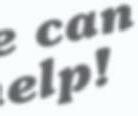
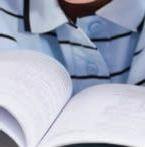
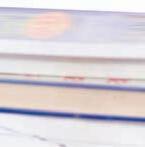

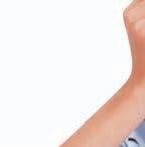
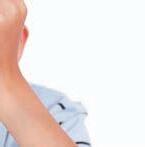




Hopefully, you’ve owned a home for a while, and you’ve seen massive appreciation. If they wanted to diversify and maybe they’ve realized they are in something bigger than what they need, I would say that now could be a good time for them to sell and downsize and put some money on the side in terms of liquidity — reinvest it in some other strategies or just have some cushioning. Sometimes a lot of people live above their means, and now’s a good time to capitalize on the market’s irrational exuberance.
How about buyers?
Don’t be irrational when it comes to buying a house. Make sure you get into asset during your inspection period. You never want to waive your rights in terms of appraisals and inspections — make sure you’re fully protected. Sometimes you get irrational and emotional over a property, but step back to the fundamentals. Buying a home is, most of the time, the biggest financial decision of the year and you don’t want anyone persuading

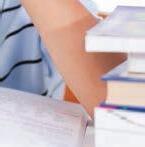

a $50,000 structural issue in six months that you waived because you were worried about a $5,000 price increase.
It just doesn’t make sense, so keep all the fundamentals in play.
Where’s the rental market at right now?
We just can’t catch up right now in terms of housing supply, so you see a lot of permits being built for multifamily apartments, town homes and the like. It’s just really hard for people to get anything. I’m not seeing any of my tenants giving me notice to move out. With a couple hundred tenants, you would think each month I’d have a couple people giving me 30 days or 60 days notice. Everyone is staying because there’s nowhere to go, especially if you’re staying in Arizona.
That’s the other issue and rents are getting super expensive. If you’re a renter right now, it’s a difficult marketplace. If you are looking for a new rental, you need to differentiate yourself. Maybe you offer six months of rent, be very
Why aren’t you selling your homes since the market appears to be at its peak?
At the end of the day, the economics are still there. If you’re using strategic low leverage and the cost of your capital is less than the yield you’re going to get on a rent side, then it still makes good economic sense to acquire more assets, because you’re arbitraged in those interest rates. Additionally, that doesn’t factor in any additional appreciation. I’m still cautiously optimistic we can continue to grow.
Additionally, there’ll be major tax consequences to sell right now. And there’s no other alternative investment vehicles that I like as well as real estate, even in real estate in the Southwest right now.
16 AUGUST 20, 2021 JEWISH NEWS JEWISHAZ.COM HOME DESIGN & REAL ESTATE REAL ESTATE & HOME DESIGN
COURTESY OF ZACHARY KEPES We can help! Does your child struggle in school? ExecutiveFunctionCoachAZ.com (480) 648-1122 LUISMMOLINA / ISTOCK / GETTY IMAGES PLUS
JN Zachary Kepes
July served as a reminder to get flood insurance
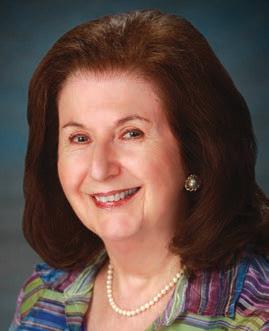
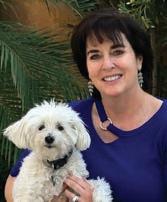 R.C. “ROMEY” ROMERO
R.C. “ROMEY” ROMERO
You’ve likely heard of a story or two in which someone lost valuable property due to flood damage. Maybe one of the stories was even yours. Last month, Arizona broke rainfall records. If you did experience flood damage, having a flood insurance policy made a huge difference, and if you don’t have one, it might be time to reconsider.
The cost of flood damage nationwide was approximately $17 billion annually between 2010 and 2018, reported Reuters in Feb. 2021. That reporting cited the testimony of Michael Grimm, Federal Emergency Management Agency’s assistant administrator for risk management.

Flood insurance is a critical part of keeping your home and valuables secure.
According to Phocus Insurance Companies, a Rosie-Certified partner, FEMA is responsible for issuing most flood insurance policies. Private insurance companies work with FEMA in areas of the country that are prone to flooding and offer flood insurance coverage to homeowners via the National Flood Insurance Program. Flood insurance coverage typically includes losses caused by flooding, erosion and physical damage, and property loss caused by flooding. Floods caused by dam breaks, clogged storm drains, excessive rain, unusual tidal surges and others are covered by your flood insurance.

Don’t assume that your whole home comprehensive policy has you covered. Phocus tells us this is seldom the case. Your home insurance likely contains a water damage subsection. Many homeowners assume that all water-related damage is covered. That is not so. Sudden and unexpected water, such as the washing machine breaking, may be covered under your insurance. If water damage is due

to negligence or a catastrophic event such as floods, you’ll find yourself footing the bill.

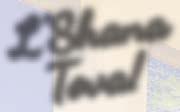

A flood is defined as a general and contemporary condition of partial or complete inundation of two or more acres of normally dry land area or of two or more properties — at least one of which is your property — from an overflow of inland or tidal waters, unusual and rapid accumulation or runoff of surface waters from any source or mudflow.
Before we get into the details, let’s go over a few terms that are important to understand when reviewing your insurance policies.
Actual cash value is the value of the item at the time of loss, depreciation over time included. Items that are assessed or adjusted at ACV include appliances or carpeting, with carpets having the potential to lose 10% to 14% of their value annually.
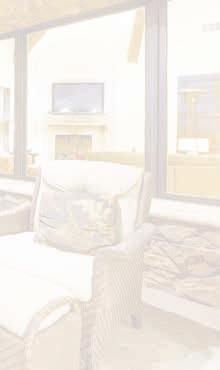
Replacement cost value is the cost to replace the item or part of your home, not including depreciation. Three conditions must be met before having an item fall under RCV guidelines:
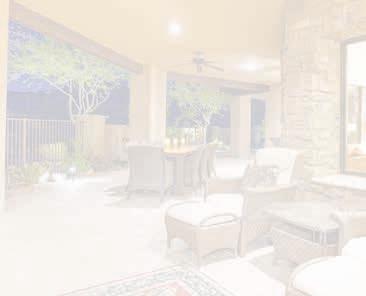
• The building must be a single-family dwelling.


• The building must be your primary address at the time of loss, meaning you have lived there at least 80% of the year.
• Your building coverage is at least 80% of the replacement cost of the building or the maximum value available for the property under the NIFP.
A standard flood insurance policy, known as a single peril (flood) policy, pays for direct physical damage to insured property up to
receive the $250,000. Flood insurance will pay the actual cash value of damages or the replacement.

Additionally, flood insurance is not considered a guaranteed replacement cost policy. If your $200,000 home burns down it might cost just as much to rebuild it. But if the liability on your guaranteed replacement cost policy was only $150,000, you would receive the full $200,000. That is not the case with flood insurance, which will not pay above the policy limit.
A comprehensive list of items covered on your property insurance vs. flood
$720 annually ($60 a month) with 1.58% of households covered. This is below the national average of $958 per year. FEMA and NFIP offer an online tool to help you figure out the estimated costs.
But paying the annual premium pales in comparison to the cost of water damage and loss of valuables. Do yourself a favor and contact your insurance agent to review your insurance policies. JN
JEWISHAZ.COM JEWISH NEWS AUGUST 20, 2021 17 HOME DESIGN & REAL ESTATE Let me be your “KOSHER CONNECTION” “I’ll treat you like family, because you are!” Amy Rosenthal 602-430-3158 AmyRosenthalRealtor@gmail.com www.AmyRosenthal.com One of the top 50 Realtors in Phoenix/Scottsdale as voted by Phoenix Magazine! BUYING? SELLING? LOCAL? LONG DISTANCE? L’Shana Tova!
REAL ESTATE & HOME DESIGN
R.C. ‘Romey’ Romero is co-owner of Arizona’s home improvement radio program “Rosie on the House.”
Toby Weinstein Broker
Full service Real Estate needs, including property management I will make your next real estate transaction pleasant, productive, and profitable. Bus (480) 948-5554 • Cell (602) 228-0265 Tobyre4u@aol.com 7077 E. Marilyn Rd., Bldg. 4, Ste 130 Scottsdale, AZ All Real Estate Agents Are Not Alike!
R.C. ‘Romey’ Romero
PHOTO
COURTESY OF R.C. ROMERO
Associate
Love it or hate it? Locals chime in on ‘My Unorthodox Life’
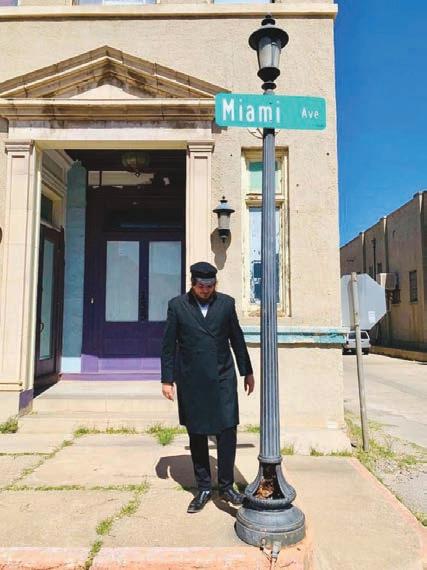 NICOLE RAZ | STAFF WRITER
NICOLE RAZ | STAFF WRITER
“My Unorthodox Life” dropped on Netflix July 14, and Julia Haart became a household name almost overnight — including in local Jewish households.
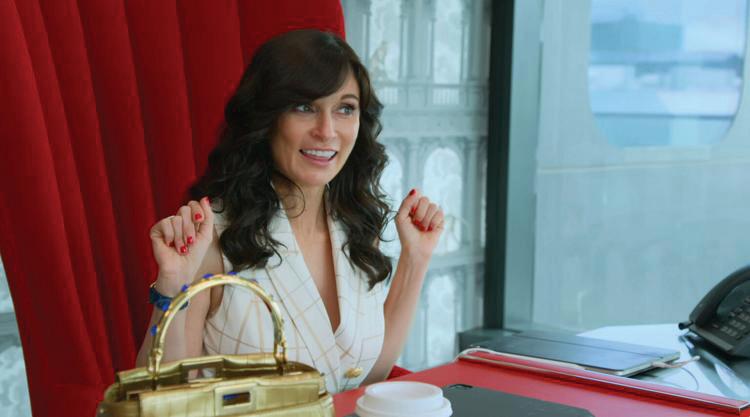
A self-described “reality TV show junkie,” it only took one day for Kathleen Kagan to watch the nine episodes that comprised the first season. But, she didn’t necessarily enjoy it.
“I was bored to tears,” she said. “I kept waiting for it to get better.”
Meanwhile, Katie Matus loved the show.
“I think a lot of people forget this is a reality show,” she said.
The series follows the lives of Haart, now a prominent fashion designer, and her four children, all in different relationships with the Orthodox world. Haart and her 21-year-old daughter, Miriam, have left religious observance behind, while her daughter, Batsheva, 27, and her son-in-law, Benyamin, are trying on Modern Orthodox Judaism for size. Her son, Shlomo, 25, still observes Shabbat but feels conflicted about certain aspects of religion, and her son, Aron, 15, identifies as a “black hatter,” committed to maintaining his strict religious lifestyle.
The series has the glamour and glitz of reality TV, with a vacation in a castle during Paris Fashion Week, helicopter trips to the Hamptons and a household staff. Haart dresses in revealing clothes, which she feels is a mark of freedom from her haredi Orthodox life; she feels a first step toward female empowerment is to embrace sexuality. She criticizes her former community for its treatment of women and girls, saying within it “women have one purpose in life, and that is to have babies and get married.”
Paradise Valley resident Dana Zucker Chesler watched the entire series in about three days, and bristled at what she saw.
“She does the complete opposite for women that she wants to,” Chesler said. “She exploits her children and makes it OK to sexualize them. She disrespects her youngest son and what his beliefs are. I realize she had a bad experience in the ultra-Orthodox (community) but many do not.”
Kagan, who lives in North Glendale, said the show was “completely unnecessary.” The world already knows there are abuses in the Orthodox community, and that girls are not always given the most freedoms that they could be afforded, she said. “But there are more
sensitive ways to handle this. This was sensationalism driven by gawkers. These are non-Jews looking to gawk at ‘oh my gosh look at how horrible these Monsey Jews are.’”
Robbie Gross, who lives in Scottsdale, couldn’t stomach watching the show, but has opinions based on what he has seen and read about it. Gross grew up in an Orthodox community in Pittsburgh, Pennsylvania and now identifies as Reform. “It’s like airing your dirty laundry,” Gross said of Haart’s chosen outlet for sharing her critiques, some of which he thinks are valid. “It’s not beneficial for anybody watching it.”
Phoenix resident Shmiel Gruys also did not watch the show, but said it is the type of thing that perpetuates harmful stereotypes. “I’m really tired of an entire community being misrepresented to a degree where I’m attacked about it in public,” he said. Multiple strangers have randomly approached him asking if he needs help escaping his community.
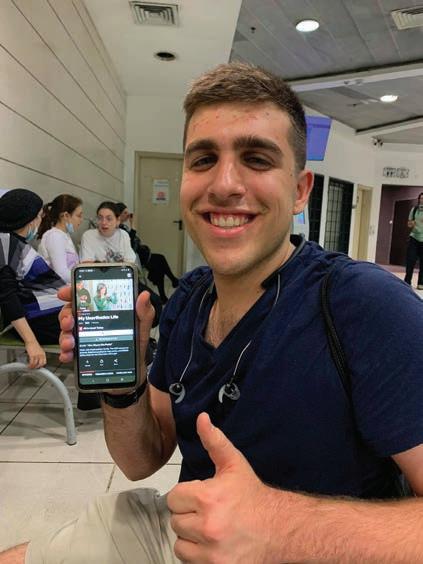
“A lot of people already have a whole narrative about me,” he said, just based on what they can see: A black hat, payos and a beard. “They come to the conclusion that I treat my wife poorly, or we’re poor, or we live off the government.”
The world has become so much more accepting, he said. “You see so many different cultures coming together, and everyone seems so accepting of different cultures — except ours.”
Brina Helfman Pepper said she was not
happy with how it portrayed Jews. “All I saw was how their money was spent,” and it did not reflect the Jewish values of giving back or charity, she said.
But Gabi Turner, a “Phoenician at heart” who lives in Ramat Gan, Israel, appreciates that the show started a conversation.
“Whether for the good or bad, at least people are starting to talk about the complexities of living in an Orthodox community and dissociation,” he said. “Whether you like the show or not, I think it was important to create that dialogue.”
Turner grew up in the Orthodox community in Phoenix and related most to Haart’s son, Shlomo. He remembers feeling conflicted about his lifestyle and religion when he attended a public high school. “I kind of lost a little of the faith, in a way,” he said. It was a difficult time, but he never fully left his religion or lifestyle behind. “I’m glad I didn’t because I love religious Judaism. But, myself, along with friends and other family members, have all gone through discovering our way through the religion.” JN
18 AUGUST 20, 2021 JEWISH NEWS JEWISHAZ.COM LIFESTYLE & CULTURE LOCAL
Julia Haart, the CEO of Elite World Group, stars in the new reality show "My Unorthodox Life." The show documents her life after leaving the Orthodox Jewish community.
PHOTO COURTESY
Gabi Turner watched some of “My Unorthodox Life” on his smartphone. PHOTO BY GABI TURNER
OF SHMIEL GRUYS
Jewish Arizonans share summer hacks to beat the heat
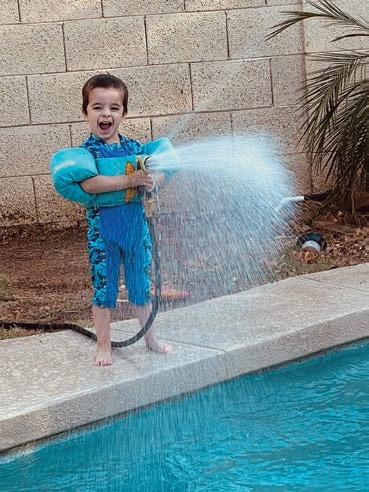
 NICOLE RAZ | STAFF WRITER
NICOLE RAZ | STAFF WRITER

Andrea Barth knows it’s summer when she feels hot in parts of her body she didn’t even know could register heat.
“At a certain point, like at that 110 degree range, your eyelids feel hot,” she joked. She is wary of complaining, though. After all, she moved to Scottsdale last summer from Queens, New York for the heat.
“It actually was one of my criteria when we were thinking of where we wanted to move, that the place had to be warm,” she said. Her second summer in, she and her family of 10 cope with Arizona summers by staying
time in the pool. Other Jews new to town are finding ways to cope, while longtime residents have a few tricks to share.
One summer hack for an “easy weather reprieve” is to take a long weekend or head two hours north “and a world away” to Flagstaff, where it’s cooler, said longtime resident Ariella LaBell.
Gail Baer recommends buying an inflatable kayak. “Super easy and fun to throw in your car and take on a car ride a couple of hours for cooler temps just a bit out of town. My favorite is Woods Canyon Lake.”
For families with young kids, Rachel Gibbs recommends putting ice packs in carseats, and Rachael Don said a visit to Cabella’s always worked for her when her kids were little.
“I know it sounds strange, but they have so many cool things to see and it was one of my favorite things to do,” she said. “It’s a funny outing, but it always worked for us. And they have a fudge shop upstairs, so you can also get them a treat!

Like Barth, Lani Harrison is also experiencing her second Arizona summer. She moved from Los Angeles in 2019. So far, summertime feels like she lives in a frying pan — with a lid on it.
“I hope my body is acclimating to it,” she
said, noting her biggest challenge is remembering to drink enough water — and reminding her kids to do the same.
She and her kids spend the summer in the pool and in their make-shift backyard splash pad using the hose. And when she has some alone time, she spends it shopping.
It’s Caryn Weiss’s first Arizona summer, but she already knows what works for her: shopping, going to the gym and whatever else she can find that’s indoors.
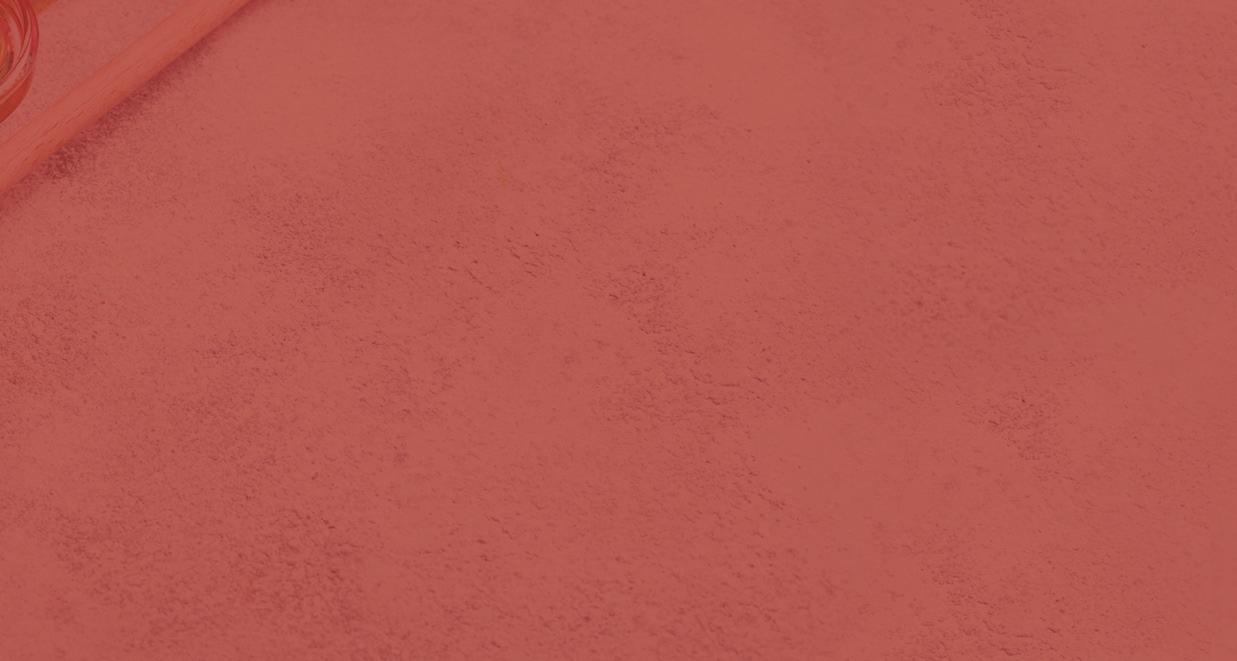
“It’s almost shocking how hot the air is,” she said. If she has to be outside, it’s only to go to her car. “You just run.”
Weiss moved to Phoenix last November from a Seattle suburb. The heat is kind of like the rain, she said. “What do you do when it rains? You stay inside.”
Farah Besharat moved to Phoenix from Los Angeles in early March.

“There’s no question about it. It’s hot. But, do I like it more than the cold? Absolutely. Do I hate it? No. Do I like walking around in my bikini every day? Absolutely.”
She is in the water or water-adjacent all summer.
Longtimer Roz Cierler Seibold finds the Arizona summer heat much more tolerable “than the oppressive heat and humidity where I grew up” on the East Coast. She gradually switched to cotton-only clothing, tries to drink half of her weight in water and wears sunscreen all year round.
Barth said she almost feels closer to God living in the desert heat — witnessing how creatures manage to survive with such little water.
“Feeling this season and the heat and the intensity is very grounding,” she said. “There’s so much nature around us here and the heat is just part of it.” JN
JEWISHAZ.COM JEWISH NEWS AUGUST 20, 2021 19 LIFESTYLE & CULTURE LOCAL
CALL NOW for more information about High Holiday packages and multiple insertion discounts! 602-639-5866 or jlipson@jewishaz.com Rosh Hashanah: September 7 & 8 Yom Kippur: September 16 ADVERTISE IN OUR HIGH HOLIDAYS ISSUES! The High Holidays are made for tradition. This year we reflect on the past, gather in-person and begin the journey of moving forward into a sweet new year. Our print and digital edition reaches 41,500 engaged, a luent and educated Jewish readers with strong buying power to wish the community Happy New Year and also to promote your products and services. ROSH HASHANAH August 27 September 3 YOM KIPPUR September 10 Traditions & Memories
COURTESY
BESHARAT
Farah Besharat at the Salt River
OF FARAH
Featured Event
WEDNESDAY,
SEPT. 1-2 and SATURDAY, OCT. 2
The Red Rocks Music Festival presents concerts at the Arizona Jewish Historical Society: Sept. 1 at 7:30 p.m. Works by Mozart, Beethoven, Schubert and Bartok will be featured; Sept. 2 at 7:30 p.m. Boccherini, Piazzolla and Dvorak will be showcased; and Oct. 2 at 7:30 p.m. Ravel, Rodrigo, Boskovich, Lavry and Schumann will be on the menu. Cost: $36. For more information and to purchase tickets, visit redrocksmusicfestival.com.
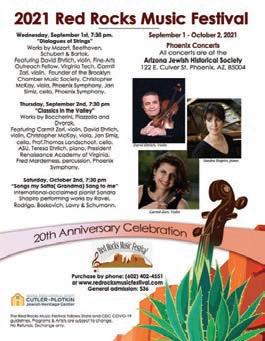
Events

SUNDAY, AUG. 22
Jazz Con Alma featuring vocals by Todd Herzog: 3 p.m. The Arizona Jewish Historical Society Summer Music Series presents a live music performance by Jazz Con Alma “featuring vocals by Todd Herzog.” A mainstay in the Phoenix jazz and latin scenes. Beth Lederman has been playing keyboards professionally for more than 35 years, and Todd Herzog’s musical education includes being a vocal jazz major in college, and it shows in his phrasing and great interpretations of jazz standards. The performance will be in-person and COVID-19 social distancing protocols will be observed. Cost: $20 for AZJHS members, and $25 for guests. For more information, and to register, visit azjhs.org/jazz-con-alma
Apples & Hunny: 4 p.m. Join Congregation Or Tzion and a very special guest from the Hundred Acre Woods to help get into the spirit of the sweet new year ahead! Meet Or Tzion clergy, eat pizza and have some fun. Geared toward families with young children. To register, visit otaz.org/YF.
WEDNESDAY, AUG. 25
Happy Hour: 7 p.m. Temple Beth Sholom of the East Valley is hosting a Zoom happy hour. For more information, visit tbsev.org.
TUESDAY, AUG. 31
Vision Board for the New Year: 6-8 p.m. Join the Martin Pear Jewish Community Center for this in-person workshop. Create a vision board in preparation for the Jewish New Year 5782. Vision boards have long been used as a tool to help define the goals and dreams you have for yourself. There is no pressure to do it “right” — each board is completely unique and personalized, with no correct look or design. Throughout this workshop, you will be guided by instructor, Alli Goozh, to first gain clarity about the goals you want to “power up” as we enter a new year, then supported as you create your own one-of-a-kind design. All supplies provided. Cost: $25 for members, $30 for guests. For more information and to register, visit apm.activecommunities.com/valleyofthesunjcc/ Activity_Search/1809.
WEDNESDAY, SEPT. 1
Not Alone: 6:30 p.m. Join the Martin Pear Jewish Community Center for this in-person film screening of “Not Alone.” Through her intimate teen-toteen conversations, the audience will learn about depression, anxiety, self-harm, suicide attempts, getting help and treating mental illness. Join Rachel Rubenstein, LCSW and Therapist, after the film to discuss how you can better know the signs of teen suicide. In partnership with iGen Parenting. Cost: $10 for members, $15 for guests. For more information and to register, visit jewishphoenix. regfox.com/movies-with-a-message-a-documentary-film-series.
THURSDAY, SEPT. 2
Beth Ami Temple Open House: 6 p.m. Interested in learning more about us and possibly joining?
Come to our open house, inside the Palo Cristi Church at 37th St. and Lincoln in Paradise Valley.
Questions? Contact Judy Lohr-Safcik at jklohrsafcik@gmail.com.
MONDAY, SEPT. 13
From Shadows to Life: 6 p.m. Join the Martin Pear Jewish Community Center for an in-person author presentation by Judy Pearson. Learn about the creation of the National Coalition for Cancer Survivorship which forever changed the definition of what it means to be a “survivor.” Part medical history, part inspirational biography, Pearson tells the story of a social movement that continues to improve life for millions. Cost: $10 for members, $15 for guests. For more information and to register, visit jewishphoenix.regfox.com/ meet-the-authors-series.
FRIDAY, SEPT. 17
Wise Aging: 11:30 a.m. - 1 p.m. In this virtual Bureau of Jewish Education course, learn positive ways to navigate a meaningful transition to your next chapter on life’s journey. Wise Aging is designed specifically to meet the social, emotional and spiritual needs of Jewish seekers entering second adulthood. Explore the tools and resources to age wisely through the lens of Jewish wisdom. Cost: $10. For more information and to register, visit bjephoenix.org/ course-events/2021/09/17/wise-aging.
THURSDAY, SEPT. 23
COMEDY: 7 p.m. Jennie Fahn’s solo 90-minute comedy, UNDER THE JELLO MOLD, makes its Arizona debut at the Scottsdale Center for the Performing Arts. The show was winner of the 2017 Hollywood Fringe Festival’s Best Solo Show and Producer’s Encore Awards and named Pick of the Fringe. Cost: $35. Purchase online at UnderTheJelloMold.com or call (480) 499-TKTS (8587).
Jews of the Southwest: 7 p.m. Join the Arizona Jewish Historical Society for an in-person film screening of “A Long Journey: The Hidden Jews of the Southwest.” The film is about self-awareness and reaffirmation, and a celebration of the richness and diversity of Jewish and Latino cultures in the American Southwest. Streaming is available as well. Cost: Free. For more information and to register, visit azjhs.org/documentary-film-series.
FRIDAY, SEPT. 24
COMEDY: 2 p.m. and 7 p.m. Jennie Fahn’s solo 90-minute comedy, UNDER THE JELLO MOLD, makes its Arizona debut at the Scottsdale Center for the Performing Arts. The show was winner of the 2017 Hollywood Fringe Festival’s Best Solo Show and Producer’s Encore Awards and named Pick of the Fringe. Cost: $35. Purchase online at UnderTheJelloMold.com or call (480) 499-TKTS (8587).
SATURDAY, SEPT. 25
COMEDY: 2 p.m. and 7 p.m. Jennie Fahn’s solo 90-minute comedy, UNDER THE JELLO MOLD, makes its Arizona debut at the Scottsdale Center for the Performing Arts. The show was winner of the 2017 Hollywood Fringe Festival’s Best Solo Show and Producer’s Encore Awards and named Pick of the Fringe. Cost: $35. Purchase online at
UnderTheJelloMold.com or call (480) 499-TKTS (8587).
SUNDAY, SEPT. 26
COMEDY: 2 p.m. Jennie Fahn’s solo 90-minute comedy, UNDER THE JELLO MOLD, makes its Arizona debut at the Scottsdale Center for the Performing Arts. The show was winner of the 2017 Hollywood Fringe Festival’s Best Solo Show and Producer’s Encore Awards and named Pick of the Fringe. Cost: $35. Purchase online at UnderTheJelloMold.com or call (480) 499-TKTS (8587).
THURSDAY, OCT. 7
Bingo for breast cancer: Join Martin Pear Jewish Community Center for The J’s second annual event of which 10% of proceeds will benefit a local cancer organization. Enjoy a wine tasting, raffle prizes, dessert, and bingo. Cost: $30 for members, $40 for guests. For more information and to register, visit apm.activecommunities.com/ valleyofthesunjcc/Activity_Search/1831.
SUNDAY, OCT. 10
Fiddler: 10 a.m. Join the Martin Pear Jewish Community Center for an in-person film screening of “Fiddler on the Roof.” Before the film, professional violinist, Maggie Martinc will play music from the musical. Cost: starting at $10. For more information and to register, visit jewishphoenix. regfox.com/movies-with-a-message-a-documentary-film-series.
THURSDAY, OCT. 21
Wine Tasting Day Trip: 9:30 a.m. - 5:30 p.m. Join the Martin Pear Jewish Community Center for a Northern Arizona wine tour that includes a private tasting at three wineries in the Cornville/ Cottonwood Vineyards region, lunch at one of the vineyards and round trip private transportation to and from The J in a luxury van. Register now as space is limited to 14 people. Cost: $250 for members, $280 for guests. For more information and to register, visit apm.activecommunities.com/ valleyofthesunjcc/Activity_Search/1890.
SUNDAY, NOV. 7
It’s Not That Simple: Join the Martin Pear Jewish Community Center for an in-person author presentation by Pam Ostrowski If your loved one has been diagnosed with dementia or Alzheimer’s, be prepared for anything - it can be a shocking disease. Ostrowski’s guidebook, walks you through what can happen and prepares you for the challenges you may face.. Cost: $10 for members, $15 for guests. For more information and to register, visit jewishphoenix.regfox.com/ meet-the-authors-series.
Community festival: Noon-4 p.m. Join the Arizona Jewish Historical Society for a community festival celebrating the 100th anniversary of the construction of the Cutler Plotkin Jewish Heritage Center. There will be music, food trucks, activities for families and children, and special guest speakers. For more information and to donate, visit azjhs.org/cpjhc-centennial.
Virtual Meetings, Lectures & Classes
SUNDAY, AUG. 22
Israeli Film Series: Stream the documentary, “By the Grace of Heaven,” with the East Valley Jewish Community Center. The film provides a rare look into life in the Haredi Orthodox community of Bnei Brak, Israel amid the coronavirus outbreak. Cost: $5. For more information and to register, email info@evjcc.org.
Virtual Tour of Auschwitz: 10 a.m. or 2 p.m. Join the East Valley Jewish Community Center for a virtual live two-hour tour of Auschwitz, including a Q&A session with Jerzy Wojcik, creator of the Auschwitz Virtual Tour Project. Cost: $29. For more information and to register, visit holocausteducation.center/public-tour/?registrants. source=newsletter.
MONDAY, AUG. 23
Anitsemitism on campus: 1-2 p.m. Rachel Underweiser conducted a research study through the Woodrow Wilson Fellowship at Johns Hopkins University called “The Perception of Antisemitism on College Campuses in the U.S. and the U.K,” which has become the largest study on antisemitism at universities to date. In her virtual presentation, she will cover the discussion of “But really, what is antisemitism? Is there antisemitism at my university? If so, what can I do about it?” Cost: $18. For more information and to register, visitvalleybeitmidrash.org/upcoming-events.
Criticizing Israel: 9 a.m. Rabbi Gideon Sylvester will present, “When, if ever, is it right to publicly criticize Israel?” Cost: $18. For more information and to register, visit valleybeitmidrash.org/event/ twhen-if-ever-is-it-right-to-publicly-criticize-israel.
WEDNESDAY, AUG. 25
Teshuva Workshop: Join Dr. David Bernstein for a virtual guided writing workshop on introspection. Cost: $18. For more information and to register, visitvalleybeitmidrash.org/upcoming-events.
Criticizing Israel: 9 a.m. Rabbi Gideon Sylvester will present, “When, if ever, is it right to publicly criticize Israel?” Cost: $18. For more information and to register, visit valleybeitmidrash.org/event/ twhen-if-ever-is-it-right-to-publicly-criticize-israel.
THURSDAY, AUG. 26
Intolerant texts: 9-10 a.m. Rabbi Norman Solomon will present on the topic virtually. Cost: $18. For more information and to register, visitvalleybeitmidrash.org/upcoming-events.
SATURDAY, AUG. 28
Selichot: 7:30 p.m. Congregation Kehillah is hosting an in-person Selichot program. For more information, email info@congregationkehillah.org.
TUESDAY, AUG. 31
Preparing Your Heart and Soul for the High Holidays: 10 a.m.Join the East Valley Jewish Community Center for a virtual presentation by Rabbi Arthur Lavinksy about preparing for the High
CALENDAR
20 AUGUST 20, 2021 JEWISH NEWS JEWISHAZ.COM
CALENDAR
Holidays. Cost: Free. Registration required. For link, visit evjcc.org/tuesdays.
WEDNESDAY, SEPT. 1
Soulful parenting: Noon-1 p.m. -2 p.m. In this virtual presentation, author Dasee Berkowitz will combine insights from thousands of years of traditional Jewish wisdom and contemporary literature on spirituality with her own utterly relatable first-person storytelling, to help parents embrace every moment with their families. Cost: $18. For more information and to register, visitvalleybeitmidrash.org/upcoming-events.
Respecting the Elderly: 9 a.m. In this virtual presentation, Rabbanit Sharona Halickman will present about respecting the eldery. Cost: $18. For more information and to register, visit valleybeitmidrash.org/event/respecting-the-elderly.
Meditation: 4 p.m. The Jewish Community of Sedona and the Verde Valley is offering a virtual afternoon meditation. Cost: Free. For more information and to obtain the Zoom link, visit jcsvv. org/contact.
THURSDAY, SEPT 9
Israel: 2 p.m. Join the Arizona Jewish Historical Society for this virtual book discussion on “Israel: A Guide to the Most Misunderstood Country on Earth” by Noa Tishby. While everyone seems to have a strong opinion about Israel, how many people actually know its history? Through bitesized chunks of history and deeply personal stories, Tishby chronicles her homeland’s evolution, beginning in Biblical times and moving forward to cover everything from the First World War, to Israel’s creation, to the disputes dividing the country today. Cost: Free. For more information and to register, visit azjhs.org/israel.
TUESDAY, SEPT 14
Museum: 10 a.m. Join the East Valley Jewish Community Center for a virtual presentation by the Chandler Art Museum about Dorothea Lange’s depression-era photography in Chandler. Cost: Free. For more information and to register, visit evjcc.org/tuesdays.
TUESDAY, Oct. 5
Music of Broadway: 10 a.m. Join the East Valley Jewish Community Center for a virtual presentation by violinist Julie Ivanhoe. Cost: Free. For more information and to register, visit evjcc.org/ tuesdays.
TUESDAY, OCT 12
Museum: 10 a.m. Join the East Valley Jewish Community Center for a virtual presentation by the Chandler Art Museum called “Frank Lloyd Wright and a New Vision for Chandler.” Cost: Free. For more information and to register, visit evjcc.org/tuesdays.
THURSDAY, OCT. 14
The Light of Days: 2 p.m. Join the Arizona Jewish Historical Society for this virtual book discussion on “THE LIGHT OF DAYS,” by Judy Batalion. Learn about the exploits of a cadre of Jewish women in Poland—some still in their teens—who helped transform the Jewish youth groups into resistance cells to fight the Nazis. Cost: Free. For more information and to register, visit azjhs.org/ the-light-of-days.
TUESDAY, OCT. 19
Healthy Aging: 10 a.m. Join the East Valley Jewish Community Center for a virtual presentation by Debbi Lavinsky, a health and wellness coach and Pilates teacher, about strategies for healthy agining. Cost: Free. For more information and to register, visit evjcc.org/tuesdays.


TUESDAY, OCT. 26
Odessa: 10 a.m. Join the East Valley Jewish Community Center for a virtual presentation by the Odessa, which will perform Klezmer music. Cost: Free. For more information and to register, visit evjcc.org/tuesdays.
TUESDAY, NOV. 2
Chopin: 10 a.m. Join the East Valley Jewish Community Center for a virtual presentation by concert pianist Elias-Axel Pettersson called, “Chopin: Bold, Imaginative and Introspective” a lecturerecital. Cost: Free. For more information and to register, visit evjcc.org/tuesdays.
TUESDAY, NOV. 16
Genealogy: 10 a.m. Join the East Valley Jewish Community Center for a virtual presentation by the Daughters of Jacob Genealogy called, “Bridge Generation: Preserving Your Family’s Story,” exploring the benefits and challenges of preserving your family history. Cost: Free. For more information and to register, visit evjcc.org/tuesdays.
THURSDAY, NOV. 18
Jews Should Keep Quiet: 2 p.m. Join the Arizona Jewish Historical Society for this virtual book discussion on “The Jews Should Keep Quiet,” by Rafael Medoff. Based on recently discovered documents, "The Jews Should Keep Quiet" reassesses the hows and whys behind the Franklin D. Roosevelt administration’s fateful policies during the Holocaust. Cost: Free. For more information and to register, visit azjhs.org/the-jews.
TUESDAY, NOV. 30
Holiday at East Valley JCC: 10 a.m. Join the East Valley Jewish Community Center for a virtual presentation by Temple Beth Sholom of the East Valley Rabbi Herschel Brodie about Chanukah. Cost: Free. For more information and to register, visit evjcc.org/tuesdays.
TUESDAY, DEC. 7
Elvis: 10 a.m. Join the East Valley Jewish Community Center for a virtual presentation by university instructor and travel writer/photographer Dan Fellner called, “Was Elvis Jewish?’ Cost: Free. For more information and to register, visit evjcc.org/ tuesdays.
MONDAYS
Partners in Torah: 7:30 p.m. Join a growing group of inspired learners with Project Inspire. Cost: Free. Tune in at: us04web.zoom. us/j/3940479736#success, password is 613. For more information, email Robin Meyerson at robin@projectinspireaz.com.
Ethics of Our Fathers: 7 p.m. Learn with Rabbi Zalman Levertov online. Tune in at: bit. ly/2Y0wdgv. Cost: Free. For more information, visit chabadaz.com.
Quotable Quotes by our Sages: 7 p.m. Learn with Rabbi Shlomy Levertov online. Tune in at: JewishParadiseValley.com/class. Cost: Free. For more information, visit chabadaz.com. Learning to Trust in God: 7:30 p.m. Learn with Rabbi Yossi Friedman online. Tune in at: ChabadAZ.com/LiveClass. Cost: Free. For more information, visit chabadaz.com.
MONDAYS, APRIL 12-AUG 23
Semichas Chaver Chabad: 8 p.m. Over the next six months the Semichas Chaver Chabad Program will be studying some of the most common melochos of Shabbos with practical applica- tion. The classes will be at the at Chabad of Arizona and will entail an in-depth text-based study of the background and underlying principals of the halacha. The topics that will be covered are: Melaben (cleaning), Boneh Bekeilim (opening packages), Borer (sorting), and Sechita (squeezing). Cost: Free. To register, contact Rabbi Dovber Dechter at dovberdechter@gmail.com or at 347 410 0785.
MONDAYS, AUG 2.-AUG. 30
Intermediate Hebrew: 4:30-6 p.m. In this virtual Bureau of Jewish Education adult education course, Sophie Platt will teach intermediate Hebrew. Cost: $50. For more information and to register, visit bjephoenix.org/courseevents/2021/08/02/intermediate-hebrew. JN
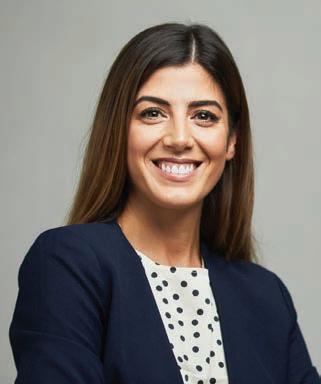
Upcoming Special Sections
High Holidays
Senior Lifestyle
JEWISHAZ.COM JEWISH NEWS AUGUST 20, 2021 21
3 From home health aides to financial planners, independent living facilities to nursing homes, this is the perfect venue to showcase how your business can help older Jewish residents navigate retirement. JEWISHAZ.COM REACH HIGHLY EDUCATED, AFFLUENT READERS IN THE VALLEY
September
Contact your sales consultant to schedule your advertising at jlipson@jewishaz.com Print | Digital | Target over 42,500 Jewish readers with a mix of print and digital.
August 27 Aug. 27 and Sept. 3 & 10 The High Holidays are made for tradition. Show our readers how your business can be a part of their memories. Ask e Expert August 27 Content devoted to the Valley’s dominant industries, economic trends and innovative entrepreneurs publishes monthly. Ask the Expert allows local business people to share insight from their field of expertise
Snack break

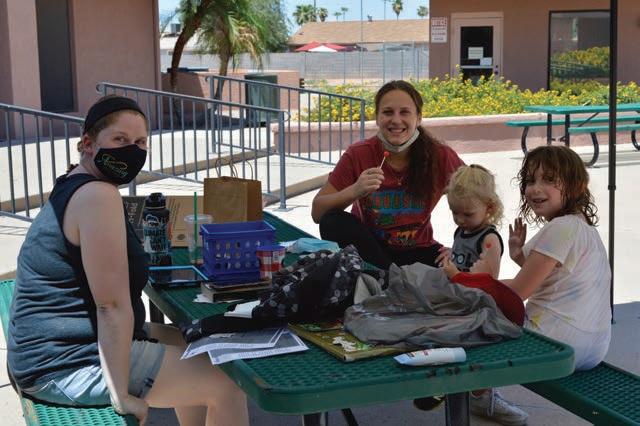

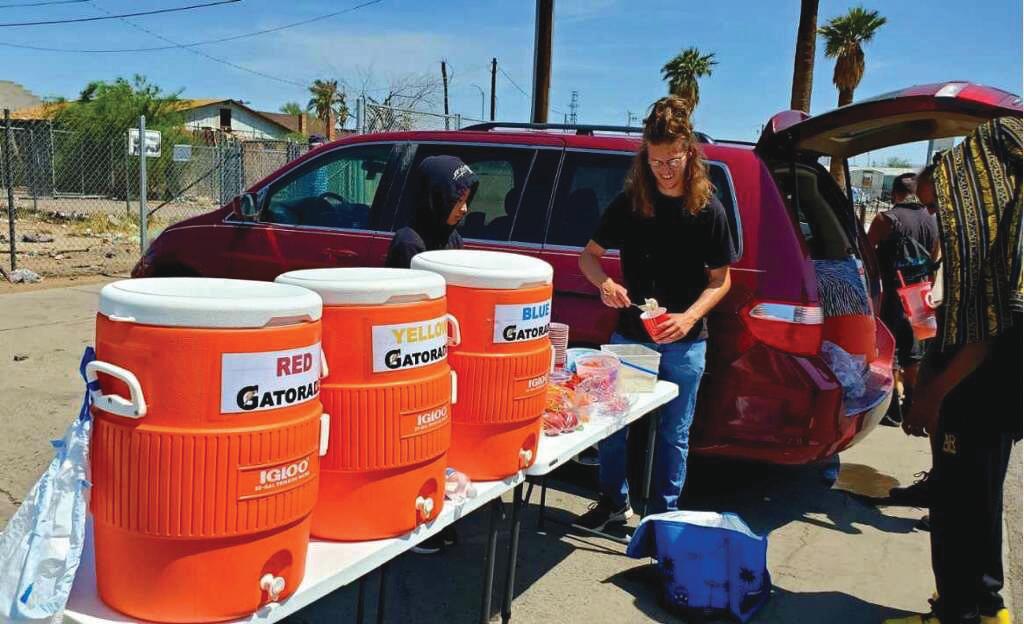
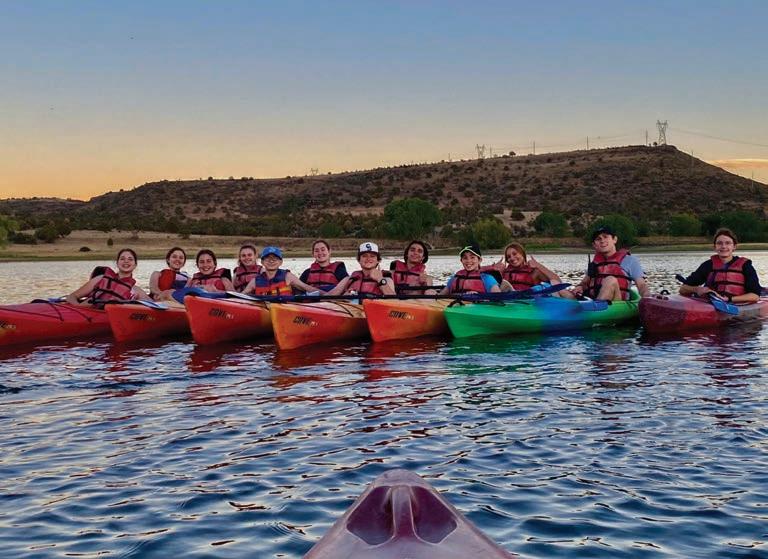

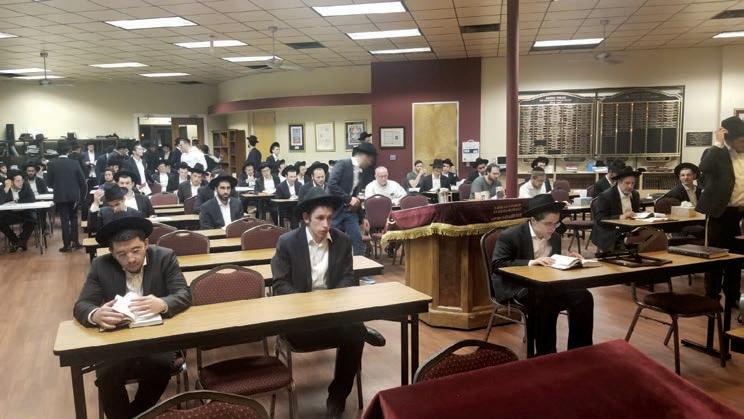
COMMUNITY This COMMUNITY page features photos of community members around the Valley and the world. Submit photos and details each week to editor@jewishaz.com by 10 a.m. Monday. 22 AUGUST 20, 2021 JEWISH NEWS JEWISHAZ.COM Pizza kit Members of Hadassah Tivah West Valley unpack pizza kits from Brad’s Kitchen, bake it and play bingo on Zoom.
COURTESY OF ANNE LEPPO
PHOTO
Pictured from left: Sarah Bochenek, Leah Millman, Gabriel Bochenek and Shaia Yardeni enjoy Temple Beth Sholom of the East Valley’s open house.
Welcome to our synagogue!
PHOTO BY MICHELE MILMAN
Beating the heat Austin Davis, a volunteer with Arizona Jews for Justice, passes out water to people who are unhoused and trying to get by in Phoenix’s extreme heat. PHOTO COURTESY OF AUSTIN DAVIS An influx of bochrim! Approximately 500 yeshiva students and their families visited Greater Phoenix this summer. Here are a few at Ahavas Torah. PHOTO COURTESY OF AHAVAS TORAH My kingdom for a horse! Campers at Camp Stein ride on horseback in the cooler environs of Prescott. PHOTO COURTESY OF CAMP STEIN All in a row Campers enjoy some canoe time at Camp Stein in Prescott. PHOTO COURTESY OF CAMP STEIN
Pictured from left: Rabbi Herschel “Brodie” Aberson, Eli Blau, Jen Zak, Hanna Blau, Tal and Dawn Yardeni prepare for an open house at Temple Beth Sholom
ARI BENJAMIN SILVERMAN
Ari Benjamin Silverman becomes a bar mitzvah on Aug. 28, 2021, at Congregation Beth Israel. He is the son of Diane Silverman of Peoria and David Silverman of Glendale.
Grandparents are Catherine and Ronald Caplan of Mesa; and Lucy and Steve Silverman of Grand Rapids, Michigan.
A student at Paseo Verde Elementary School, Ari enjoys creating and playing video games; playing tennis and soccer; drawing; assisting neighbors with yard work and other chores; and spending time with friends, brothers and his two guinea pigs.
JADON MICHAEL WOLDOFF
Jadon Michael Woldoff becomes a bar mitzvah on Aug. 21, 2021, at Beth El Congregation. He is the son of Leisah and Ron Woldoff of Phoenix.

Grandparents are Bob Berkovitz of Mesa; and Sarah Woldoff of Phoenix.
For his mitzvah project, Jadon collected school uniforms for Vista Colina, a Phoenix homeless shelter for families, and donated his hair to Locks of Love. A student at Pardes Jewish Day School, Jadon enjoys making gaming videos, playing video games with friends, reading and playing flag football. JN
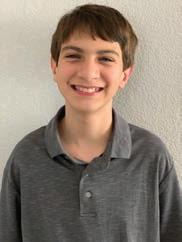
BRIEFS
CONTINUED FROM PAGE 9
documentary’s filmmakers are at work developing a curriculum based on Ravina’s story. It will also be designed for online learning.
“We recognize the need for this as Arizona and several other states are now mandating Holocaust education in public schools,” said Klein. “We feel that Ruth’s story in particular will engage and enthrall student audiences who will be carrying on the memory and awareness of the Holocaust and genocide into future generations.”
Klein took six years to work on the project, compiling hours of interviews and conversations. The documentary has won awards at four film festivals and the Best U.S. Documentary award at the Los Angeles Theatrical Release Competition. JN Tickets and passes can be purchased at phoenixfilmfestival.com.
Seymour “Sy” Schonwetter, 90, died Aug. 14, 2021, in North Scottsdale. Sy was born April 27, 1931 in Hampstead, New York. He and his brother grew up in Italian neighborhoods on Long Island and the Bronx, where their parents owned Italian grocery stores. He experienced antisemitism daily and learned to defend himself in after-school fights. When he was eleven, the family moved to Schenectady, New York, where he was known as the tough kid from New York City. He worked every day after school in his family grocery store, and was deeply affected when his father, whom he considered his best friend, died while Sy was a freshman in college.
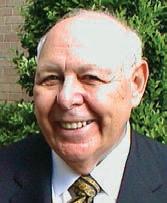
Sy had his bar mitzvah in Schenectady, and graduated from Nott Terrace High School. In 1953, he graduated from Siena College with an accounting degree. He was the first person in his family to graduate from college. He started his career in Albany, New York, as a state employee, working first as tax examiner, and later as an accountant for the Public Service Commission.
On Sept. 4, 1954, he married his first wife, Janice Sarah (Ginsburg) Hope, and together they had three children. In 1967, Sy left his accounting career and the family moved to Minnesota, where he and Janice co-founded Weight Watchers of the Upper Midwest. He remained affiliated with Weight Watchers until he and Janice divorced in 1984.
In the 1970s, Sy went into banking with a single bank building, growing to five bank buildings and an insurance company. He sold his businesses to what is now Wells Fargo.
He married Claire (Tolchinsky) Rothstein Nov. 24, 1984, and moved to Arizona. They maintained a second home in Minnesota, where they spent their summers.
Sy was most proud of being a good father, grandfather and of giving tzedakah to many Jewish and civic causes. He and Claire contributed to the Jewish Federation of Greater Phoenix, the Martin Pear Jewish Community Center and were written in the generational book of the Federation. They were benefactors to the Mayo Clinic, and contributors to many civic causes. They also endowed a chair in life science hosted by the Technion of Israel.
Seymour Schonwetter is survived by his brother, Abe (Bunny) Schonwetter; children, Stuart (Regina), Barbara and Michael (Roxanne Richardson) Schonwetter; his stepchildren, Thomas Rothstein and Nancy Judson; grandchildren, Nina, Sophia, Elliot and Julian; step-grandchildren, Chad, Tyler and Luke; and step-great-grandchild, Zera. He was preceded in death by his parents, Sol and Fannie (Meyers) Schonwetter; wife, Claire; stepson, James; and step-grandson, Matthew.
He was a kind, generous and optimistic man with a good sense of humor. He treated everyone with respect and dignity. He will be deeply missed by his family and many others.
Zoom funeral service 2 p.m. (CDT) Friday, Aug. 20 and Zoom shiva, 6 p.m. (CDT) Saturday, Aug. 21. Email zoom3@hodroffepstein.com for link.
In lieu of flowers, memorials are preferred to Minneapolis Jewish Family & Children’s Service or the Jewish Federation of Minneapolis or Scottsdale.
Carole Brooks Rosenblatt passed away peacefully Aug. 11, 2021, at home surrounded by her family, friends and dogs.
Carole was born in Brooklyn, New York on July 4, 1929.
Carole and Jay were married in 1951, and had just celebrated their 70th wedding anniversary. The family moved to Scottsdale in 1969. Carole had just celebrated her 92nd birthday.
Carole is survived by her loving husband, Jay; son, Neil; daughter, Jodi; daughter-in-law, Diana; grandson, Eric; and her dogs, Cooper and Bailey.
Carole lived her life to the very end, even with multiple health issues.
Carole’s memory will live on in the hearts of all her family and friends. She was always positive and always looked at life on the bright side. She was the shining star and her legacy will live on forever with everyone she touched. Her laugh will put a smile on your face. May she rest in peace.
Services will be held at Messenger Pinnacle Peak Mortuary, 8555 E. Pinnacle Peak Road, Scottsdale, AZ 85255.
In lieu of flowers, donations can be made to Foothills Animal Rescue, 10197 E. Bell Road, Scottsdale, AZ 85260 or Ellie’s Army Foundation, elliesarmy.org.
On August 7th, Roberta (Wohlman) Davidson died peacefully while sleeping in Scottsdale, AZ.

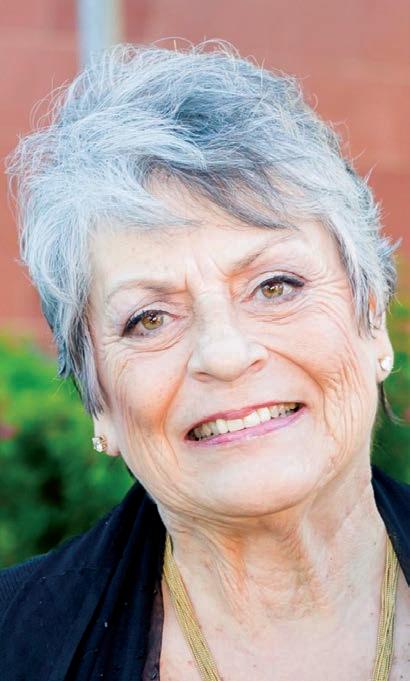
She was just 4 days shy of 77 years old. Roberta, or “Bobbie” as she was known to many, is survived by her children, Alyssa Krauss of San Diego, Joshua Davidson of Scottsdale, and Craig Davidson of Cave Creek; her sister Stella Leff of London, Ontario, Canada; her former spouse Dr. Maurice Davidson; and her 9 grandchildren, Ryland Davidson, Ethan Davidson, Avi Davidson, Zachary Krauss, Miranda Krauss, Jaren Davidson, Sarah Davidson, Zoey Davidson, and Lilah Krauss.
She was preceded in death by her beloved parents, Jennie and Albert Wohlman.
Roberta was born on August 11, 1944, in Detroit, Michigan. She graduated from Mumford High School and went on to attend Wayne State University. Roberta loved to spend time with her grandchildren, cook for her family, and to travel.
A memorial service for Roberta was held Thursday, August 12th at Mt. Sinai Cemetery in Phoenix, Arizona. In lieu of flowers, the family asks that donations be made to Congregation Beth Tefillah in Scottsdale, Arizona.
MILESTONES BAR MITZVAH JEWISHAZ.COM JEWISH NEWS AUGUST 20, 2021 23
40-CLASS SERIES: The 40 Greatest Debates in Jewish History!
Rabbi Dr. Shmuly Yanklowitz
Aug 10, ‘21 - Jan 11, ‘22 @ 10:00 am PT
Reading Intolerant Texts in a Tolerant Society
Rabbi Norman Solomon
Thursday, Aug 26 @ 9:00 am PT
Abortions and Halacha
Rabbi Yoni Rosensweig
Thursday, Oct 14 @ 1:00 pm PT
Honeybees and Torah
Rabbi Amalia Haas
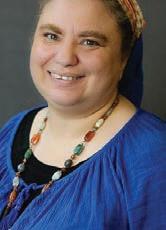
Wednesday, Nov 17 @ 1:00 pm MT
How Heschel Taught Me To Be An Artist Mindy Weisel
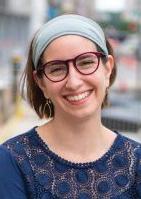
Thursday, Dec 2 @ 1:00 pm MT
When, If Ever, Is It Right To Publicly Criticize Israel?
Rabbi Gideon Sylvester
Monday, Aug 23 @ 9:00 am PT
The Perception of Anti Semitism on College Campuses in the U.S. and the U.K.
Rachel Underweiser
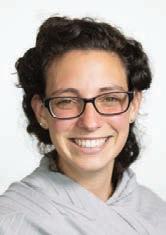
Monday, Aug 23 @ 1:00 pm PT
Respecting The Elderly
Rabbanit Sharona Halickman
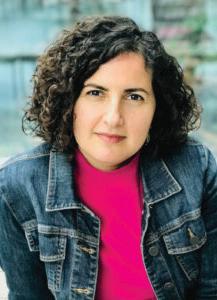
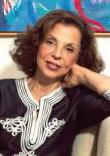
Wednesday, Sept 1 @ 9:00 am PT
Beyond Caging: Restorative Justice and Rethinking Safety

Rabbi Dr. Aryeh Cohen
Wednesday, Oct 20 @ 1:00 pm PT
How Many Lovers Are in the Song of Songs?
Rabbi Dr. Devorah Schoenfeld
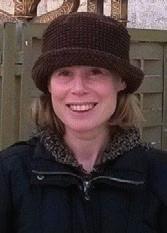
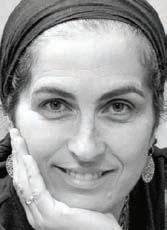
Monday, Nov 1 @ 1:00 pm PT
Disability and the Politics of Healing
Rabbi Julia Watts Belser
Monday, Dec 6 @ 1:00 pm MT
Becoming a Soulful Parent
Dasee Berkowitz
Wednesday, Sept 1 @ 12:00 pm PT
Torah with the Way of the Land: The Legacy of German Judaism and Some Questions for Ethically Engaged Jews Today
Professor Paul Franks
Thursday, Oct 21 @ 1:00 pm PT
The Jewish Genius for Surviving Catastrophe In Person
DR. SHERMAN MINKOFF MEMORIAL LECTURE
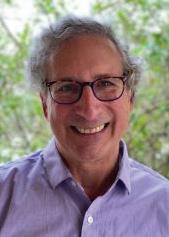
Rabbi Ed Feinstein
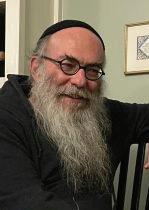
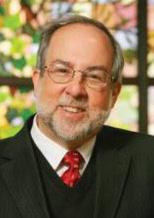
Thursday, Nov 4 @ 7:00 pm PT
Early Zionist Approaches to the Existing Arab Population
Lauren Cohen Fisher
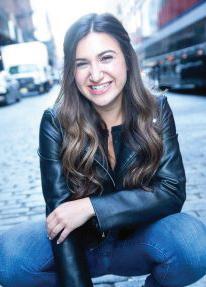
Monday, Jan 24, ‘22 @ 1:00 pm MT
Practical Teshuva Workshop – “Guided Introspection”

Dr. David I. Bernstein
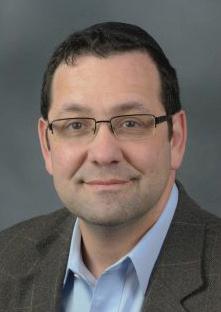
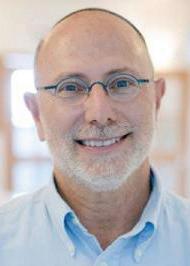
Wednesday, Aug 25 @ 12:00 pm PT
Squirrel Hill: The Tree of Life Synagogue Shooting and the Soul of a Neighborhood
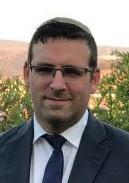
Mark Oppenheimer
Monday, Oct 4 @ 11:00 am PT
The Chassidic Story: A New Window to God
Jonnie Schnytzer
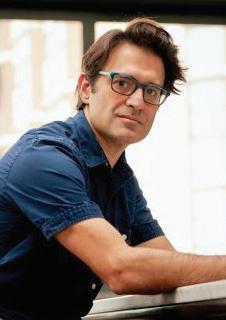

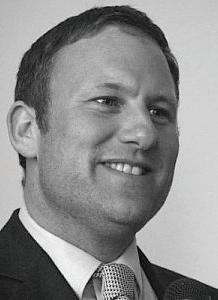
Monday, Oct 25 @ 1:00 pm PT
Hannukah in the Bible?
Professor Marc Zvi Brettler
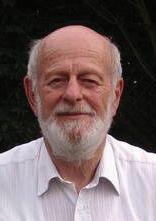
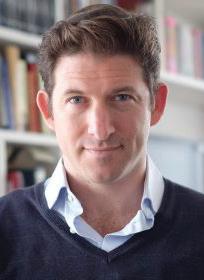
Monday, Nov 29 @ 1:00 pm MT
From Flood to Rainbow
Rabbi Avi Strausberg
Monday, Jan 31, ‘22 @ 1:00 pm MT
Almost all events on Zoom, just $18 per event!

Pass Holders enjoy unlimited attendance for $54 a month Learn More at www.ValleyBeitMidrash.org



24 AUGUST 20, 2021 JEWISH NEWS JEWISHAZ.COM
with Valley Beit Midrash All Season Long
Learn
Season
Ruach Hamidbar
























 NICOLE RAZ | STAFF WRITER
NICOLE RAZ | STAFF WRITER















 PAUL ROCKOWER
PAUL ROCKOWER













































































 R.C. “ROMEY” ROMERO
R.C. “ROMEY” ROMERO










 NICOLE RAZ | STAFF WRITER
NICOLE RAZ | STAFF WRITER



 NICOLE RAZ | STAFF WRITER
NICOLE RAZ | STAFF WRITER










































